#i need to see the survivors parallel
Note
I don't want to add it to the post (bc I don't want to get into it with assholes) but! I'm literally Japanese-American, and I would say that Hiroshima and Nagasaki are similar to Gaza and Rafah not just in the amount of firepower directed at them but in that they're both CIVILIAN POPULATIONS. it's not about the nuclear weapons (reading comprehension website.jpeg) it's about the inhumanity of the collective punishment in service of US interests. Hiroshima and Nagasaki were not individual or unique events -- look at Laos, look at Cambodia, look at Vietnam and Korea and what the States did there!! it doesn't "lessen" the horror or tragedy at all to compare them to Palestine now, especially if that comparison will help to stop it. I need white ppl to shut the fuck up about Japan permanently I stg anyways sorry people are being weird and fuckshit about this.
I think people are stuck on the differences and not willing to look at similarities when it comes to Gaza. Like when we compare its not in an effort to dismiss the differences and "triviliaze" (hate when they say that) but to show "Hey remember when something really bad happened back then? And everyone today is like I can't believe that happened? You can stop something like that from happening today by helping here" which people are allergic to doing for Palestine because they're so caught up in the minutae that they can't see the big picture. I've seen descendants of survivors of Vietnam say this is exactly what happened to them. I've seen Bosnian Genocide survivors say the gaslighting is similar to what they experienced. Holocaust survivors and their descendents! Even Hiroshima in the modern day is drawing parallels! We need to make comparisons to examine similarities and contextualize events in history. Why else learn world history if not to understand the patterns of operation in the modern day? You have beliefs surrounding certain atrocities, things like "I won't let that happen again" or "I would fight that" and that's why people are drawing parallels. To make people take action.
And this isn't limited to just Gaza, people do the same with Sudan and DRCongo. And people who do it for sudan even claim to support Palestine! Even though Gazans are asking people to pay attention to Sudan because they see themselves in their struggle! No one is paying attention to the main idea "stop this before it gets worse"!!!! It's already so bad for all these places and that damage is irreversible in that people live with it for the rest of their lives but yes! We can stop it before a complete erasure happens! It's possible! These comparisons are necessary and important!
602 notes
·
View notes
Text
Alexandria Ocasio-Cortez was in a car talking with her staffers about legislation and casually scrolling through her X mentions when she saw the photo. It was the end of February, and after spending most of the week in D.C., she was looking forward to flying down to Orlando to see her mom after a work event. But everything left her mind once she saw the picture: a digitally altered image of someone forcing her to put her mouth on their genitals. Adrenaline coursed through her, and her first thought was “I need to get this off my screen.” She closed out of it, shaken.
“There’s a shock to seeing images of yourself that someone could think are real,” the congresswoman tells me. It’s a few days after she saw the disturbing deepfake, and we’re waiting for our food in a corner booth of a retro-style diner in Queens, New York, near her neighborhood. She’s friendly and animated throughout our conversation, maintaining eye contact and passionately responding to my questions. When she tells me this story, though, she slows down, takes more pauses and plays with the delicate rings on her right hand. “As a survivor of physical sexual assault, it adds a level of dysregulation,” she says. “It resurfaces trauma, while I’m trying to — in the middle of a fucking meeting.”
The violent picture stayed in Ocasio-Cortez’s head all day.
“There are certain images that don’t leave a person, they can’t leave a person,” she says. “It’s not a question of mental strength or fortitude — this is about neuroscience and our biology.” She tells me about scientific reports she’s read about how it’s difficult for our brains to separate visceral images on a phone from reality, even if we know they are fake. “It’s not as imaginary as people want to make it seem. It has real, real effects not just on the people that are victimized by it, but on the people who see it and consume it.”
“And once you’ve seen it, you’ve seen it,” Ocasio-Cortez says. “It parallels the same exact intention of physical rape and sexual assault, [which] is about power, domination, and humiliation. Deepfakes are absolutely a way of digitizing violent humiliation against other people.”
193 notes
·
View notes
Note
I noticed that the element of the triforce that the individual characters are supposed to represent, is also their weakness.
Zelda's wisdom is being stifled by doubt and lack of experience; she's eager to learn, but her zeal is not enough and relies on faith and Link to save the day. I'm not implying that wisdom and faith cannot go hand in hand, but she needs to be able to represent her element more. Maybe her wisdom is knowing when to wait and allow someone else to bear the task? But it takes away too much initiative from her.
Ganon's element is power but he's the one who ends up losing almost every time. And Ganondorf on his own, isn't powerless! He's a king, he knows magic, he can wield almost any weapon, he's patient, conniving and intelligent and knows how to make best with what he has. He isn't weak! And yet, the whole split happened, because he was feeling powerless.
They locked themselves in a self-sabotaging cycle that's powered by doubt.
Yeah! So one of the reasons I really love the Triforce lore is that it’s a three-way mirror that reflects both what the user has and also what they need (very wizard of oz).
Ganondorf is a very powerful man, physically, and magically.
Politically, though, he’s next to helpless, which is an awful thing for a king to be. He’s a king of thieves in OoT, because the Gerudo are not a wealthy or thriving nation there. In-Game they don’t have a local living area like the other regions (or even a store — just one floating bombchu salesman in the middle of the desert) — they’ve got a post-war fortress full of guards, and a temple that is being used as a secret base Hylians can’t get to.
Consider also, Ganondorf is the most highly decorated of the Gerudo, and he’s not decked out in gold. He’s wearing mostly iron and topaz. Nabooru and Twinrova are the only ones who have gold fixtures/jewelry along with the higher ranked guards for their protective elements (which is why I think it could arguably be pale bronze or yellow brass, which is a common and highly durable gold alternative).
The Gerudo are implicitly just surviving in OoT, and Hyrule speaks of them like they’re monsters (except for the one guy in town who has a fetish). More than that, WW establishes that his real grief comes from the weather, which any mortal is powerless to control.
So Ganondorf is powerful as a person, but powerless as a king, which is literally the only thing he was born to be.
Be that as it may, though, he is a well-loved king, and a survivor, and a thief, so he also has to embody both wisdom and courage too!
Zelda is the most obvious mirror to Ganondorf. She is a very powerful woman politically and magically, but physically-- compared to Ganondorf -- she's terribly meek. That's the obvious read, that they're 1:1 Parallels, but her real weakness lies in her courage.
Zelda (in OoT) leans on her massive political power -- In the child timeline, she literally sees a foreign dignitary executed before he does anything wrong, based on a recurring dream she has.
Do you know how insane that is? Do you realize how powerful she is?
Ganondorf is not just some guy -- he's a foreign KING. He's a KING that a TEN YEAR OLD had EXECUTED based on VIBES.
And we think she embodies wisdom because her vibes were (as we, the audience know) correct. But it's actually because as an adult, she understands that none of it needed to happen that way. That the only reason Ganondorf was able to pull off his stunt and get the Triforce at all was because she tried to control the situation, sending Link to gather everything Ganondorf couldn't get himself and put it all precisely where Ganondorf needed it to be.
Despite being a child at the time, by the end of the story, by the time she's Sheik, Zelda is taking full responsibility for what happened, and is doing everything in her now extremely limited power to fix it. She's so sorry to need Link, and at the end of it all is desperate to give him another chance to be a kid, and to be innocent, and to be happy, because she realized so quickly that she never should've involved him, visions be damned. She knows none of it was his fault or his business, and she's mortified that she dragged him into it in her own attempt to control the weather.
These other two items shift in other games -- WW and Twilight Princess show us a Zelda with tremendous courage and very little power, physical or political. And then the Wild's era, despite removing the Triforce narrative, shows us a Zelda with immense power and terrible guilt and insecurity -- her power locked behind her fear, and she is only able to access both when she embraces courage.
Which brings us to Link.
Link, on the surface, is a third wheel in a chess game between ancients. But the reality is that he's the base of the prism. He's the foundation that reflects both of the others.
There are MANY different personalities for Link, and personally my favorite gag is that Link is simply too stupid to be scared, but that's just a gag -- because something I've come to really enjoy and respect about him is that he consistently displays fear. Link embodies courage because he is full of fear and chooses to fight anyway. Link leads a good life. He is comfortable, he has family, he has friends, he knows peace. What makes Link courageous is that he is willing to give up his access to all of that if it means that everyone else keeps theirs.
Link will lock himself in a room with the apocalypse if it means he's the only one who gets hurt, and it's not because he believes this is his sacred duty, or his life's purpose -- he'd much rather be at home chasing chickens around or riding his pony through some pretty scenic route -- it's because he is so full of love for other people that he's willing to give up anything to keep them safe.
Link's not very powerful, but he is also unburdened by any desire to be powerful. Link's not very wise, but he is unburdened by any desire to be wise. Link is content in who he is, Link is happy to keep things simple. But Link is so brave that he becomes a leader, which actually makes him the most dangerous of the three.
Courage, unburdened, is fucking terrifying. To both Wisdom and Power. Because, unlike Wisdom and Power, Courage is contagious.
Link can empower and inspire and reveal truths others might not have been able to find on their own. Link doesn't need charisma or brutality. Link can build armies just by being observed.
"But Sketches, you haven't really said anything about how Link reflects the other two." It's subtle! But he does. I see it like this:
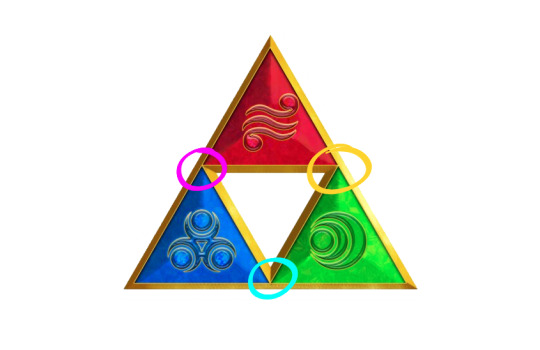
• Ganondorf reflects Link's relentless determination, refusing to stand down in the face of impossible odds. In this way, they're connected by their power and courage.
• Zelda reflects Ganondorf's burden of being born in a crown, forcing them to learn leadership, and how to use their recklessness strategically, as children. In this way, they're connected by their power and wisdom.
• Link reflects Zelda's sense of love for the faceless innocent, and her dedication to protecting all who can't protect themselves. In this way, they're connected by their courage and wisdom.
Because the inherent configuration of the triforce requires those connections to be balanced -- Separately they are overwhelmed by their traits. Ganondorf is willing to sacrifice everything he is in order to reach his goals, Zelda is so pre-occupied with preventing prophecy she ends up instigating it, and Link is so ready to step in and help that he never considers the consequences.
Every single one of them, left to their own devices, would rather see themselves destroyed than fail those who may or may not be relying on their success. They're all very similar, highly reflective characters who all represent compelling foils for each other and yes, display how their unfettered strengths are also the thing that damage them most.
#i LOVE triforce plot#I will never stop loving triforce mythos#FUCK good versus evil give me people being desperate and flawed#lozhc#oot eidolon#this is a very sloppy disorganized essay but I'm done looking at it I'm setting it free laksjdla
255 notes
·
View notes
Text
Rewatching Crimson Peak & Things of Focus and Notice:
As a child at her mothers funeral, Edith wears butterfly/moth earrings
Is the pen her father gifts her the one she later uses to stab Lucille? He describes the importance of having “The right tool for the job,” is that foreshadowing for gifting her the tool to begin her escape from Crimson Peak?
Is Edith wearing a butterfly hair clip when she dances the waltz with Thomas?
Lucille’s iconic crimson red gown is so detailed, so beautiful. It represents the skeletal ghosts with its spinal column along the back, crimson peak itself in color, the carapace of a bug on the sleeves and structure, and the upper bodice has trim that blooms outward (present similarly in her blue gown) but is bisected by buttons…creating a familiar shape…a moth?
The candle they hold during the waltz is held at the same level Edith holds her iconic candelabra, a subtle parallel
The trim on the collar of Lucille’s black dress references the spikes and trims of gothic architecture - which is very heavily featured in Allerdale Hall
Lucille says that: “At home we only have Black moths, formidable creatures but they lack beauty.” Knowing the parallel between her and moths, it implies that she sees herself as a survivor and powerful, but something no longer beautiful because of it
Lucille places the butterfly she holds directly into the ants, an action that’s brutal but quick. Is it foreshadowing to her execution of Edith’s death? Something quick for such a beautiful thing, done by her hand?
The LOOK Lucille gives Thomas when they realize Edith’s father knows their past. THE LOOK (JESSICA CHASTAIN YOUR ACTING)
“You seem the more collected one my dear” Lucille is called this. She always holds the mission undetered in her mind, as opposed to Thomas who seems more easily swayed by emotions
When Thomas breaks Edith’s heart by ripping apart her book. He says: “What do you dream of? A kind man? A pure soul to be redeemed? A wounded bird to be nourished?” He is telling her exactly what he is. None of those things, none of the dreams she has built of him in her mind. Not with a past and life such as his.
The significance of gramophones and wax cylinders: it is what plays when Edith’s father is murdered, it is also what saves her from meeting the same fate
I want to know more about Lucille!! Her character is so rich, so so complex, she needs more screen time!!
Need a prop replica of the ring NOW
[the house] “is a privilege we were born into, one we can never relinquish” METAPHOR ALERT METAPHOR ALERT metaphor for the cycles of abuse and trauma they could not break
HOW THE FRICK did I MISS the fact that Thomas’ workshop is in the attic when that was where him and Lucille were locked up as children. SO MANY IMPORTANT SCENES HAPPEN THERE. So many significant to their past we never see, so many ghosts not visible but are so real and present to have caused this
The trail of smoke like red essence that emanates from the ghosts as they walk, like they are still bleeding
Lucille’s hair looks black in darker lighting, but a dark brunette in others. It’s provides a black, dark shroud when she’s in America, and catches more light when she’s in Allerdale Hall
“I like to think she can see us from up there. I don’t want her to miss a single thing we do.” UM MA’AM
“…in time, everything will be right” LUCILLE QUEEN OF FINAL OMINOUS STATEMENTS IN SCENES
The amount I WISH to explore this set. To pry apart each detail and pick apart each piece, so much of it had to be handcrafted pieces for the movie or vintage pieces sourced for it. LET ME IN
THE LIGHTING MUAH
The ghost in the hallway has a rope dragging behind her…is this a gory detail, or an allusion to how she may have died (if not by poison)?
The ghost in Edith’s dream is pointing, though it is never shown to what. Is it to the exit, her warning to leave as all the other ghosts try to do?
The children’s laughter after the presumed scream of their mother’s ghost as she is stabbed, is it just for creepy effect, or did Lucille and Thomas actually laugh after they murdered her?
The scar on Lucille’s lip? Never noticed it before!
Not the first time I’ve noticed it, but the act of her clutching hot steaming food with her bare hands is chilling every single time
Were the bodies of Thomas’s wives left in the vats of clay? I don’t know HOW I didn’t make that connection before, originally i thought it was merely for creepy effect.
Many people villainize Lucille and try to make Thomas out to be solely a victim. But as stated in the wax cylinder, he was fueled by his desire to pay for and make his machine. Him and Lucille are both complacent in using their victims money for their own gain
We need to bring Chatelaine’s back into fashion. That is all.
The scrape of the spoon over the porcelain cup, it screeches and is a subtle way that shows Lucille act of caring has a harshness to it, an unpleasant sound resulting from an otherwise pleasant action: tending to Edith
Such an interesting camera choice to have the camera focus in a circular inwards and outwards
also also Lucille has a temple scar on her forehead?
The small amount of glee Lucille takes saying Edith “thought [she] was was a writer” as she throws the pages to her novel in the fire.
The absolute deadpan, matter-of-fact-ness Lucille has to Edith when she signs the papers “you have nothing to live for” & “mercy killings.” This is a familiar repeated cycle
“Sign your name! Sign your bloody name!” Bloody is not just for emphasis. Edith’s name is soon to be nothing but blood
Lucille’s night gown sleeves as she flies down the stairs in pursuit - like a moths wings fluttering towards its prey
Lucille and Edith fought each other with bare feet on the stone and in the snow
Lucille is the only one of the two who knows how to start Thomas’s machine, because she was the one who witnessed it working
It is only the stab wound on Thomas’ face that bleeds and smokes when he is a ghost, perhaps because it is the wound that bears his betrayal by Lucille, reminiscent of tears of his lingering pain
Edith now has a facial scar, gifted to her by Lucille, who bore ones of her own. It is a passage, a continuing of the cycle, but it is its finale. It is Edith’s souvenir from Lucille, who took her own souvenir (her hair) from the other like a prize
#a very exhaustive list from my most recent rewatch of one of MY FAVORITE MOVIES#crimson peak#many many thoughts#lucille sharpe#edith cushing#thomas sharpe#cissarambles
215 notes
·
View notes
Text
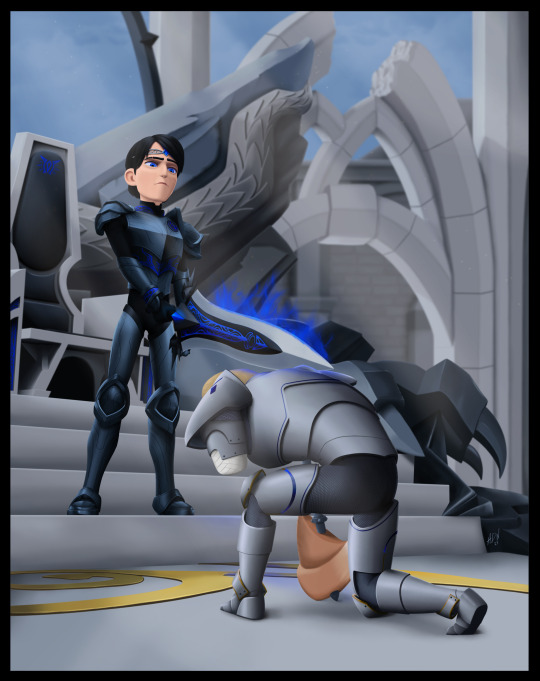
Thank you tumblr for absolutely destroying image quality. Freaking wtf?
Some more Dark Excalibur AU
The Knighting of Steve Palchuk
We all agree that Steve needed a better arc than what RotT gave him. He deserved a chance to be a hero, a path that he started in Wizards before it fizzled out into being the comedic relief. Wizards set everyone up as the better generational mirrors to Camelot. Jim to Arthur, Claire to Morgana, Douxie to Merlin, Toby probably to Galahad, and Steve very obviously to Lancelot. I've said at the start that no one comes out of this AU unscathed, so while Steve gets the heroic redemption, it comes at a cost, one that pulls on that parallel.
RotT in the Dk-E still happens, I'm not letting everyone get their happily ever after at the end of Wizards. But I'll be damned if I end it with Toby and so many others dead, and Jim pushed into a timeline reset. You can thank Steve for that. It's because of Steve that Toby lives. Steve goes with Toby in the Taco truck, and it is Steve that yanks Toby out of the way of the collapsing debris. But Steve becomes pinned himself, resulting in the loss of his arm. An act of selflessness and bravery, valor and sacrifice, that earns him the title of First Knight of the Roundtable of New Camelot. An equal advisor, responsible for not only the protection of Camelot, and those Jim has claimed as his (which is everyone, human, troll, changeling, down to the last gnome), but also finding and training new knights, those who value all life and are willing to fight to protect it, and want to see the worlds of man and magic together in harmony instead of hate and fear.
And so we come to the Knighting of Steve Palchuk. This isn't just pomp and meaningless ceremony, this has true weight and meaning to both Jim and Steve. Jim pulls on Excalibur's magic, his voice resonating with ethereal power, creating a bond of trust and loyalty that goes both ways, only formed if given willingly. Knight to his King, King to Knight, both to the protection of all worlds and their peoples. Jim's eyes light up in tandem with the blade as the power of Excalibur and Nimue courses through him, flames licking along the blade's edge and into Steve. Steve's armor reflecting this bond as the magic burns through him.
And like Lancelot, Steve will get a fully functional prosthetic arm. There will be hardship, adapting to this new reality. But Steve has become a hero. A man of courage... far from his highscool self. A survivor, who will fight with everything he has.
Rise now, Sir Steve, First Knight of the Roundtable and New Camelot.
Closeups below
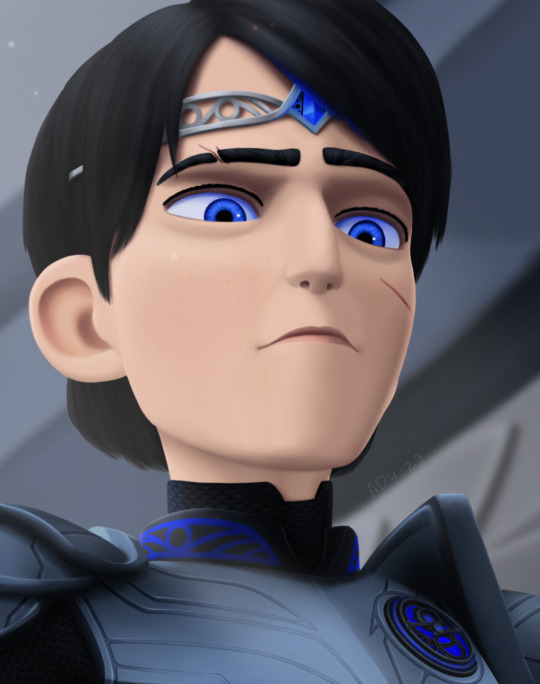
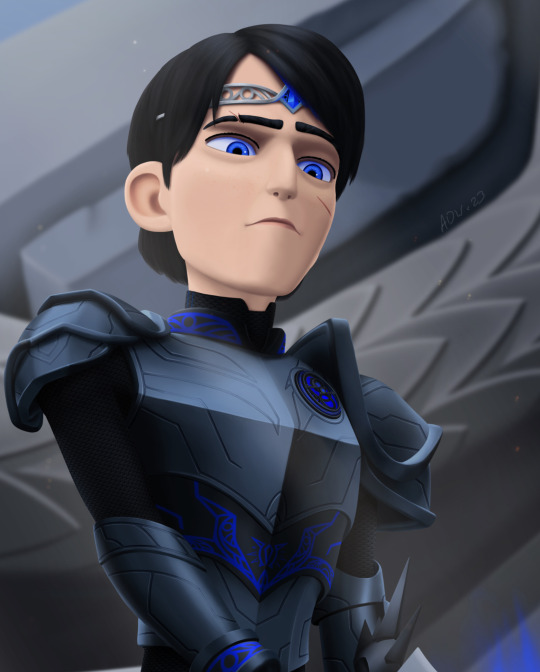
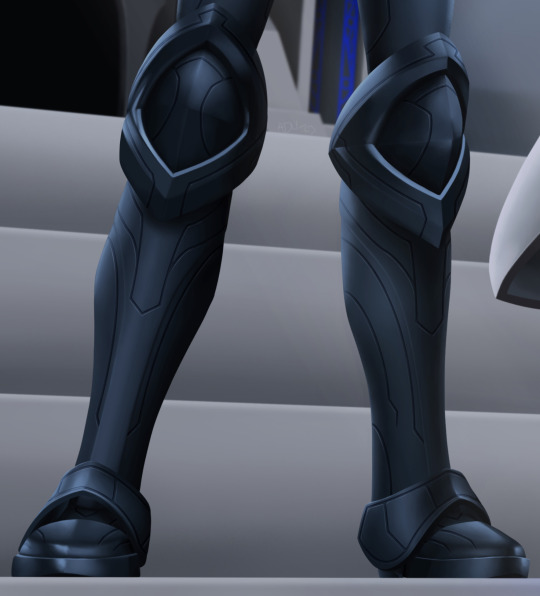
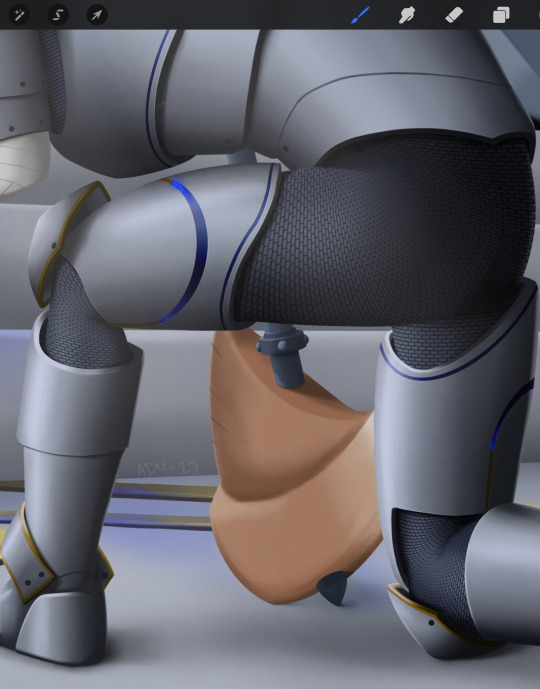
Notes: some of the descriptive wording around the ceremony itself came from a discussion about Jim using Excalibur for the knighting, and are used with permission of Sakon76, who is a much better writer than I.
Expect more if Steve's story at a later time.
#Dark Excalibur AU#trollhunters#jim lake jr#steve palchuk#tales of arcadia#toa#toa trollhunters#trollhunters tales of arcadia#toa wizards#trollhunters toa#wizards tales of arcadia#wizards toa#rise of the titans#rott#trollhunters rise of the titans#james lake jr#jim lake junior#james lake junior#king jim#dark Excalibur
219 notes
·
View notes
Text
Danse & Hancock's parallels are eating my sanity slowly so by God I will write them here
So. Usually incredibly shy about posting my feelings about characters and my interpretations of them, but I don't think I can sit idly by without addressing 1. how much I love this post about Danse and how his story ties back to the isolation and loneliness of autism, and 2. how much I need more content between Hancock & Danse to exist, because my god sometimes I forget they hate each other in-game. (I strongly suggest you read the post mentioned & linked, they do a fantastic job framing Danse in a way I don't think I could fully articulate)
Danse & Hancock both have stories filled with themes of intense loneliness. Despite their hard work, effort, and prowess in the things they love, it doesn't take good sight to realize that neither of them are very well liked. It's not that they aren't respected, but whether it's Danse's all-too-formal approach to speaking, or Hancock's combination of hard drug use & almost constant overbearing presence (on top of years of slander from bigger cities, but we'll get into that), people see them as a tool of success and a good asset to have around, but not much of a friend, so to speak. Especially in Hancock's case, many people he is overly-affectionate with are often more annoyed by his presence than anything else (even if they do like him).
For Hancock, despite how much he claims to not relate to the isolation of the common ghoul, he's likely over-exaggerating his charisma in an effort to make himself more easily approachable, mostly for his own peace of mind rather than for others. While he sounds quite passive about things many others would react strongly to, I feel it's a combination of him having replaced a layer of how he truly feels with an element of sass on top of the drug use that makes all the trauma more easily bearable (to mixed effect).
One of his lines that has always struck me as conflicting with how he portrays himself is a common generic line he has while traveling with Sole Survivor, praising them for "living out the day" when most others could not. Hancock has seen so many people die to the brutal hands of the Commonwealth; whether it be Vic and his boys gunning down innocent drifters, seeing people succumb to the elements, or, in this case, simply not surviving their travels with him, Hancock seems to have a track record of never properly establishing proper bonds with others before they either die, or decide he's too overbearing to deal with further. He's one of those characters who desperately wants to have a deeper connection with those he loves, but he has consistently lost the chance to do so before he was ever ready, and so he chooses to fill the void with meaningless sexual relationships and one-night stands- anything to make him temporarily forget how much he hates himself and his almost comical lack of social understanding. It's a train of thought that I, as an autistic person, can really understand and relate to-- the desire to know people, but always feeling like no matter how you portrayed yourself, no one seems to want to be around you if you don't provide them with what they desire. It's caused him to deeply undervalue both how much he's done for people (since he believes its expected of him to constantly bend over backwards for the needs of others), and himself, all at the same time.
I don't think Danse fully recognizes how lonely he feels, a lot. He's been so heavily indoctrinated by the Brotherhood of Steel into believing that this is how he should be treated, that his work is for the betterment of humanity, that his sacrifice is a necessary one. The way he speaks almost carelessly about late brothers and sisters in arms makes me think really hard about how rooted this idea of only existing for the "greater good" is. Individuality is questionable & almost taboo, being different is outright abominable. It's the reason why the rhetoric of "Us vs. Them" works-- the BoS as a collective believe that they are doing good for all of humanity, and any outlier to that "perfect" formula is a threat not only to the BoS, but to everything they know. Danse is expected to bend over backwards for people, and no longer questions his loneliness or isolation, as he has all but given up his sense of self for what he believes is right. Another thing that I and many of my autistic friends relate to; a sense of justice so strong that it's overpowering. Like us, Danse is willing to sacrifice anything to do what's right... including himself.
Knowing this, it's easy to understand why he hates Hancock, and that backwards mindset is the reason Hancock hates him. It's an especially vicious cycle that constantly feeds into itself if unchecked, and Hancock knows that he alone cannot convince Danse to break that cycle. Hancock knows he can't beat Danse in a fight; all he has are his words, and logic is useless against an enemy that heeds to no truths. Even after Danse discovers his true nature... you can't expect him to unravel the years of constant reassurance that what he was taught was right in a single night. "Rome wasn't built in a day," and no one gets over their trauma so quickly, either. It's traumatic to have an explanation as to why people hate you. A catch-all reason to people's fear and distaste to you, that is also something you can never, ever change. Danse would sooner hate himself for what he is than accept those he used to murder without a second thought. It's the difficult reality of anyone attempting to unlearn painful conservative narratives; the shame & guilt of hurting others that are more similar to you than you ever wanted to know is sometimes more painful than realizing what you really are.
Hancock, albeit not even close to "recovered" from his mental woes, is much further along the path of acceptance to Danse, but not far enough away that he wouldn't understand where Danse is coming from. For so long, he sat idly by and watched people get hurt, even during his time in Diamond City. The constant conditioning to accept other people's pain as long as it wasn't happening to you still eats at his consciousness; just like Danse, he knows it was wrong to accept it, but the guilt makes it harder to deal with. He, of all people, would understand what it feels like to try so, so hard to fit in, to be normal and accepted, but never quite hit the mark of understanding where he fits in society. That's the reason he is the way he is now; his signature, his "Hancock," is to be as loud and out-of-place as possible-- a constant rebellion against what people expect him to be, a rebellion of oppression and unfair treatment. Danse's sheer existence is an involuntary rebellion of all BoS values, and even if Hancock would be hesitant to become close to Danse for a long while, I think he would be impressed by him, in the end, and more importantly, understand where he's coming from.
Their combined interest in both protecting the people they care about as well as the collective societies those people come from, as well as how nerdy they both are about US history... I think, eventually, they will realize how similar their lives were, how similar they are to each other, and maybe even find some comfort in knowing that they aren't alone in all of the waves of shame, guilt, and loneliness. That there is an overarching group of people who understand them, and that they do have a place in this world. I think once they recognize that similar traumas can manifest in polar opposite conditions (ones that they used to have a narrow, black-and-white outlook on), they'll also find that there is no real reason to hate each other anymore; the world has told them that they must hate each other, but they no longer have any need to listen.
TL;DR autistic Danse & Hancock ftw
#fallout 4#john hancock#paladin danse#sorry for the long analysis im just rotting over them so hard#fo4#i think they deserve the world#and maybe also therapy#fuck you todd howard for not finishing Danse's arc i cry#ARGHHH i hope people understand my vision...
219 notes
·
View notes
Text
A warm hug to Non, or when are we going to stop demanding perfection from victims
It's been forever since I thought about making this post but I've finally decided to write the goddamn thing.
Three disclaimers : one, I haven't yet managed to get past the first third of episode 9, so this whole thing is based on episodes 1-8 at best. Two, I'll block on sight again if I see victim blaming on this post. Finally, I'm by no means an expert on the subject. It's complex, I might get things wrong and I'll have to oversimplify at times for clarity and brevity's sake, please don't kill me for it. It's probably gonna be long enough as it is. I've tried my best to organize my thoughts in a way that would make sense, but. Well. I hope it does.
Trigger warning for mention of suicide, bullying, grooming, sexual assault, rape
Non started as the poor little baby everyone wanted to protect -both the audience and Jin ; for all the shit he got after filming Non and Keng, there are a lot of parallels to draw between him and the audience. Then the dreaded episode 7 happened and all hell broke loose. I won't include screenshots of the disgusting things I read from some viewers about Non, but Jin's reaction is pretty telling already.


The easy explanation would be that he's mad Non isn't returning his feelings, but I think it has more to do with Non not fitting his 'good victim' role anymore. There's sadness on his face, but the dominants are anger and betrayal. Non tries to regain agency and gets crucified for it.
So what's a good victim ?
Non, basically
If you want an examplary blueprint of what society defines as a good victim and survivor, someone worth justice, defending and loving, just take a look at Non. I broke it down in four marks that need to be checked :
-Innocence : none of the person's action prompted the abuse
-Moral high ground : the person has values and displays kindness
-Helplessness : the person cannot do anything about the situation they're stuck in
-Accepting to be saved : self-explanatory. The person has to accept the help that's offered to them, traditionally by a love interest
Non is abused for being poor, something he's not responsible for. He's hardworking, honest, passionate about the things he loves and commits to his engagements. He's kind when talking with Jin. He's resilient in the face of the gang's bullying. None of what he could do or say would make it stop, neither can he help owing Por for a camera he hasn't broken nor get out of Tee's pyramid scheme. His mental illness only increases this impression of vulnerability. Jin doesn't have all these elements, but he's got more than enough to paint a very similar picture of Non as the audience.
As for accepting help, Jin repeatedly offers some -and Non finally lets him in during their conversation on the rooftop. What Jin offers may be little but it's still help ; Non smiles and even gives Jin a shove -what I think is the only time he initiates contact with Jin at all.


"Thank you so much, Jin, for helping me all along." "It's alright, I'm glad to. I just want to see you smile again, Non."
The audience gets even more of Non being happy and grateful to be saved : he calls his "♥" contact for help multiple times, smiles at the reminder to take his meds and, later on, clings to Phee for dear life after trying to kill himself. He doesn't fight him, he doesn't reach for the scattered pills. Hell, even accepting Tee's offer to make money could count as Non agreeing to be saved by everyone around him.
Non checks all the marks. Everyone in the audience is rooting for him, the other boys can all go get impaled on a branch, and Jin looks at him like he hung and lit all the stars in the sky.
Speaking of the other boys...
Tee and Por victims as well but don't get the same amount of sympathy, if any. Tee isn't responsible for being stuck in a criminal environment and can't get out of it ; no one has offered help, so he gets a pass. But he's been shown to be selfish, opportunist, often cowardly and sometimes gratuitously cruel.
As for Por, it's even worse : every actions he takes seems to confirm his dad's opinion of him. The only mark he ticks is accepting to be saved by his mother, which looks very bad taken on its own. I made a post about Por not too long ago if you want more.
The only way for them to redeem themselves and go from 'horrible people who should die' to 'maybe they don't suck they're my poor little meow meows' is penitence. Take Por ; he's the archetype of the rich son who gets abused by his dad and suffers from having so much money. Just like Kang in Dangerous Romance, or Tanthai in Laws of Attraction. Tee ? I don't have names from the top of my head, but he's that hardened jaded guy stuck in a mafiosi network who has to learn to love and be loved again (enters White). Yet the audience learnt to root for these characters.
Basically, nothing is set in stone. Your status as a good or bad victim can shift depending on your actions and the way they're framed. The usual narrative is to get those characters to grow into the acceptable victim pattern. DFF however is going for reverse development (Non, Jin) or stagnation (Por, Tee, Fluke). It makes for gritty yet very realistic storylines ; and while I'm the first to yell that the masked figures should get their ass stat, I also recognize that there's much more complexity to them than this. Except Top. I have yet to come up with a good explanation for what they're doing with Top, but I will at some point.
How did Non fall from grace if he's such a good example ?
Three points : Phee, the paradox of the demand for Non to seek agency but not too much, and his inacceptable betrayal.
Phee as a magnifying factor
I love this kid to bits but Phee's appearance in the flashbacks concurs with Non's flawless image being torn to shreds for a reason. He's a good, strong and caring person who loves and tries to protect Non -something the audience has wanted to do for weeks ; so we all gathered behind Phee and made him our emissary, carrying out the impossible task outsiders to the series' world couldn't : saving Non.
Since Phee voices the questions and concerns of the audience, we are Phee to an extent. Betraying Phee means betraying the hope and love and care the audience has for Non. Phee is the series' moral compass by that point. I'm sure you see where I'm going with this. If not, consider it's a surprise tool that will help us later. When Phee gets hurt by Non or decides he'd be better off lost and dead.
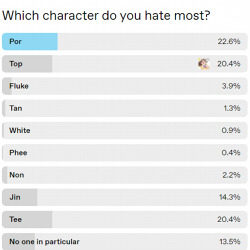
For the record, in this poll Phee gets even fewer votes than White
Seek agency, but not too much
Discontent starts to rise with the helplessness point first as viewers start to question why Non doesn't ditch the group. Why he's putting himself through such trouble. Non changes from being subjected to others' action to being the subject in a grammatical sense. Yet Non has hiw own reasons to stay (how much does the movie mean to him ? How many hours and sleepless nights on the script ? How long would it take for him to find another chance to get enough funding ? How big of a dream is it for him ?). It's the first occurence of the audience claiming to know best what's good for Non.
Complaints quiet down when Non does try to leave for good only to be stopped by Jin. We saw him try, we saw him fail, he really couldn't leave so he's off the hook.
Jin also makes sure Non remains a perfect victim by bringing him back into the group. I'm not accusing Jin of trying to make Non suffer on purpose ; he's a good guy at heart, come fight me to death on this hill. But the only way for him to exist in Non's life is to remain a savior of sorts. If Non leaves, there's nothing to save him from. Which brings us to my next point.

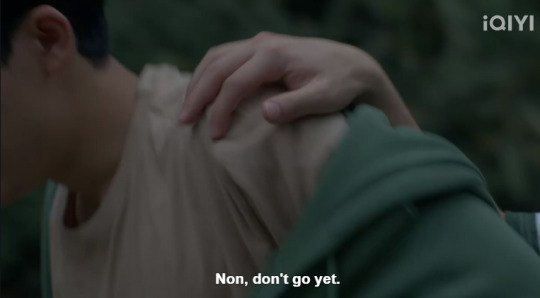
Non must try to solve things by himself, sure. But not too much. Because when you thrash to regain control of your life, you might break a few things in the process. Especially if you have to wrest it away from well-intentioned but firm hands.
He rejected Jin's offers to help numerous times. He looked anything but thrilled when Phee put himself in danger to clear his name. He refused to change schools at first, only to begrudgingly agree when Phee insisted. This insistence is the heart of the matter : Phee is sure he knows best, so he bulldozes through Non's objections and hesitation : he doesn't consult him before asking his dad for help, he speaks in his place when Non doesn't answer his proposal, he puts the bracelet on his wrist. He asks him if he's taken his meds, just in case.
Phee has the audience's benediction in doing so. Part of it stems from our knowledge of future events : we know it's going to end bad for Non. We know he has to get the fuck out. We know whatever decision he makes will be a bad one. Kids and teenagers as a whole are often deemed unable, or not mature enough to make informed decisions anyway. Just look at Non's mother telling him to prioritize his studies so he can go abroad like his brother. Multiply it tenfold for people with mental illnesses ; they get babied on a daily basis. So Non cannot, I can't emphasize it enough, cannot do anything.
All of the above end with Phee getting his way. Non can't win against him, so he chooses to lie instead.
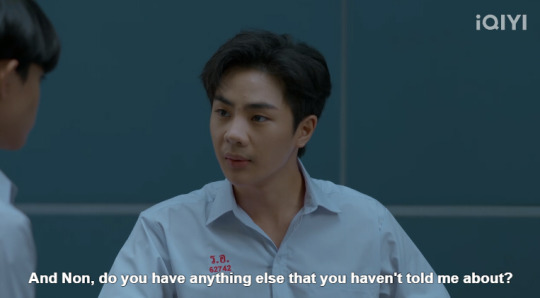

Aside from willing to be in charge of his own life, Non's refusal to let Phee help is also rooted in love and fear. While Phee would offer him an easy way out as he did for the bank accounts, it would most likely only be easy for Non and put Phee in danger. Both their survivals are held in that curt 'no'.
He's already straight up refused help, and now he loses the moral highground by lying (to his perfect holy savior Phee of all people). From here on out, any action he takes will be his -which is what Non wanted ; it's his life, and he won't be a bystander in it. But it also means that he jumped off the pedestal he'd been put on to land on thin ice.
And guess what, Non is a multi-dimentional character in a difficult situation who weighs more than a poor little damsel in distress. Of course said ice cracks. And the Non hate train gets started.
The betrayal
Lying and refusing help to go get it from the worst place he could have had was bad enough. But sleeping with his teacher while he had a boyfriend (Phee, for heaven's sake) ? Unforgivable. Cheating is the BL equivalent of every cardinal sin, the worst of the worst, and no matter the circumstances you'll get roasted for it.
And yet there are circumstances. One, especially, and it's called motherfucking grooming. I won't elaborate on this point cause I've done it over and over already, but Non was groomed by an adult. Does he see things that way ? Probably not. In his mind he's in control of the situation. He can lie to Phee about it because there's no reason for it to backfire. He does what he has to if he wants to save himself, using he one weapon he has : his body. It's cheating, but cheating in a game rigged for you to lose.
Society has two opinions about sex. It's either holy or gross. Take Jin, for instance.

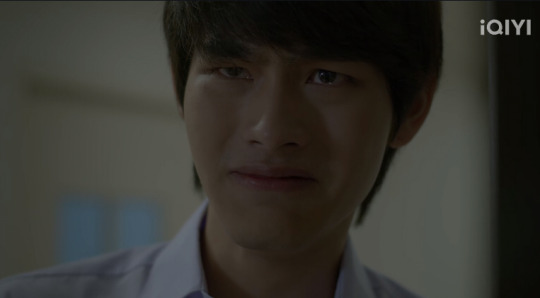
See the look on his face. He's heartbroken, he's sad, he'll live through it. Witnessing Non having sex with his teacher when he has a boyfriend ? Now that's another story. That's a betrayal.
A betrayal of what, exactly ?
Of this goddamn image Jin had painted of Non. The same the audience was given to see prior to these events : Non was perfect and loveable and worth defending, an innocent, pure, helpless baby in need of saving. So when the illusion shatters in what society and especially BL culture hold as the worst action possible, people feel fooled. Stupid, if you will. And they turn their hatred to Non. Non lied to us ! He pretended to be good, dear god, to think I loved such filth ! My heart is so dirty now, ew.
But Non didn't lie. He lied to Phee, but that's it. Everything else was expectations and assumptions. Fail to meet them and suddenly everything is your fault. It's Non's fault for refusing to be dragged along in his own life anymore, Non's fault for lying in order to get some control, Non's fault for lying again not to lose Phee when caught by surprise, Non's fault for listening to Jin, Non's fault for resorting to use his only weapon to get out of a situation he was cornered in, Non's fault for being tricked into thinking any of the decisions he made regarding Keng were his own, Non's fault for everything.
He wanted to claim his life back and made a mistake, yes. He doubled-down on it when he realized it was too much for him to handle. He clung to it and did his best to keep it together. He dared not to be the perfect victim he was supposed to be ; to try when everyone knew he was bound to fail. And you know what, sometimes there's stuff that's someone's fault, consequences they didn't foresee, things they said, slips and falls, and they're still victims, just as much as they were before.

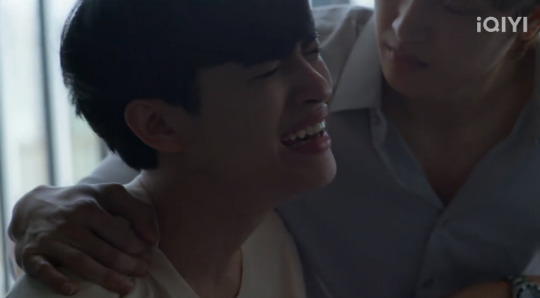
I believe that dealing with his debt himself is as important to Non as finishing the movie is. He's ready to be used and abused (by Keng in the former, the group for the latter) and to break his own heart, values, pride and sanity. He's the most resilient and dedicated character in the show to me.
But the world doesn't necessarily see it that way. So when Non realizes the mess he's made of everything, he fights Keng (who represents his desperate and violent search for complete independence) to reach for the bracelet he got from Phee. He wants help. He needs it. But he's not a victim anymore and any help is denied.
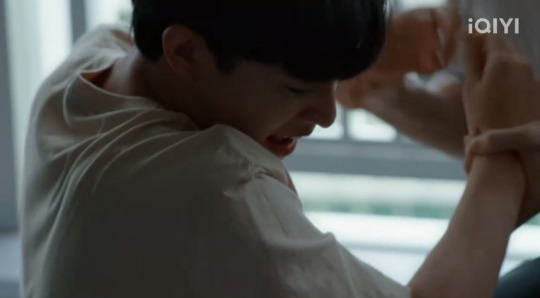

Both Phee and Jin later manage to reconcile their broken image of Non with the man he actually is. Too late to save him, but they still did. I have a hunch that things would have been different if Phee had beat up Keng and taken a crying Non in his arms, holding him tight while whispering none of it was his fault. But our moral compass fucked up, like the hurt kid he is.
What some people did by blaming and hating on Non is closer to the hateful comments he got on the video than Phee or Jin's reactions. They're far worse.
That's the big takeout. What if we stopped stigmatizing or idealizing sex ? What if we stopped demanding perfection and so-called purity for someone's trauma and status as a human being not to be negated ?
Anyway, here's a hug to Non and every victim who live in the paralyzing fear of a single slip. You can make mistakes just like the rest of us. You don't owe anyone perfection.
I'll end this rant on a bright, happy smile. I don't see a good ending for Non, but god knows he'd deserve it.

#I tried to structure it a bit#key word is try#I was angrily typing it and working with a word salad#I hope I didn't lose sight of my point halfway through#but whether I rambled on or not I needed to write it#cause I'm tired of people sorting victims out and choosing who gets respect and justice#and who doesn't#dead friend forever#dff the series#I spent too long on this gotta go shower now
93 notes
·
View notes
Note
hey! i really enjoy your analysis of aang and zuko's relationship, and i was just wondering if you have any thoughts on this:
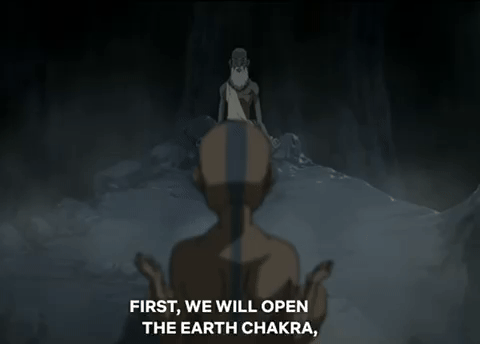
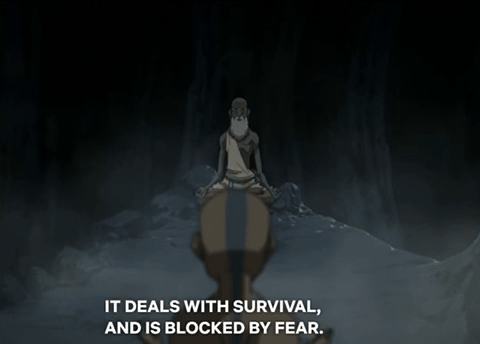
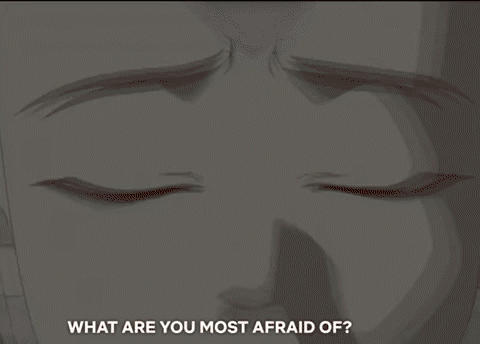
when aang considers what he's afraid of the most, he doesn't just see zuko - he sees the blue spirit. why do you think his fear is linked to that mask? zuko was the most amicable towards him when he put that mask on, and was hostile every other time.
Ooooh!! This is such a rich and meaty question!! And it's something I've wondered about but never dove into before.
I guess there are a couple of questions we need to explore. One, do we want to begin to analyze this from Aang's perspective or the series' themes, which, when put together, should offer us the fullest idea of what the intent might be? If we begin with Aang's perspective, then the next question we need to next ask what is Aang's view of Zuko and/or the Blue Spirit at this point in the narrative? My worry about beginning at that intimate level is that we might miss possible connections that a thematic understanding might facilitate and may, like many fandom analyses, leave it at a character level when, in fact, the characters exist to serve larger philosophical purposes, especially in a show like ATLA.
So, we'll return to those questions about Aang after we visit some questions about the broader themes here. We know for a fact that the team did a lot of research into Eastern philosophies that they had to then pack down into 24 minute episodes, preserving a surprising amount of complexity not in the words but in the actions and visuals. The 2 part Crossroads of Destiny episode is probably the most evocative of this practice. The four-way fight scene is celebrated for the way it masterfully shows character development through fight choreography. Then, Aang's crystal chamber he forms to master the Avatar State is a direct reference to a statement about pre-enlightenment in one of the foundational texts about Japanese Zen for American Buddhists, "The Three Pillars of Zen." The rapid explanations of the seven chakras with Guru Pathik might seem like a a skimming of Tantric beliefs based on the brief statements and processing, but it's another prime example the way ATLA suffuses meaning beyond the script.
What more can be said about the Earth (also called the Root or Muladhara) Chakra, then, that the show might reflect without stating it explicitly. Guru Pathik explains that the Earth Chakra "deals with survival." Is there any subject more prescient than that for our protagonist, the single survivor of an otherwise all-encompassing genocide? Other accounts of this chakra that I can find explain that it's at this chakra that one can observe that their base needs are being met--enough food, enough water, etc. There seems to be a subtle witnessing to the effects of PTSD here then. With this chakra untouched, unopened, and out of balance, Aang within his mind has been living in a state of emergency without knowing it, believing himself at a core level beyond his consciousness to still be under immediate threat even in moments of peace like his meditations throughout the opening of his chakras. "Your vision is not real," Guru Pathik points out, not to say that no danger exists for him in the world but to illuminate the immediate reality surrounding his person.
The memories and visions that flash during the sequence hint at how fear conceals deeper realities and thus possibilities. I'll start with the clip of Katara sinking away from the first episode of Book 2, "The Avatar State." The Earth Kingdom General performed this cruelty after many other attempts to force Aang into suffering to gain the Avatar State. Believing he lost another person he loved, the state was triggered despite the actuality that Katara was unharmed. The fear of her loss overwhelmed Aang, and even her safe return could not assuage his traumatic response. The Blue Spirit incident forms a striking parallel to this event, in that case. Aang felt himself helpless and in danger only to discover the opposite: the seemingly malevolent force freed him from danger. Further, that Blue Spirit Mask concealed Zuko who, by the end of the series, will be revealed (to himself and) Aang as an ally and a friend. The shadowy image of Ozai, then, connected with these two fear-inducing semblances, can be seen then as perhaps the ultimate foreshadowing of Aang's ultimate success in pacifying Ozai. Put in the context of this chakra and the other two visions, it frames the Firelord as a facade meant to induce terror and distance, when in reality, life and humanity still lay behind the horrifying megalomania.
Concerning the Blue Spirit element specifically in the series, I want to explore one more factor within the series before getting back to Aang's character relationship in this moment. Blue has a running symbolic theme within the series that seems especially relevant here since it played a huge role in a highly symbolic part of the directly previous episode, "The Earth King." As Zuko rides out his psychogenic fever induced by releasing Aang's bison and abandoning his Blue Spirit mask, he is confronted in his dreams by a blue dragon voiced by Azula and a red dragon voiced by Iroh. I felt really confused by these two would-be shoulder angels for the longest time (literally until I was sorting my thoughts out to write this) because Azula's blue dragon is the one who entreats Zuko to rest, which even in Grey Delisle/Azula's clearly threatening tone--she even ends the temptation by saying "sleep just like mother!"--seemed to be what Zuko needed to do as opposed to the red dragon's exhortations to get out. I could see how sleeping might also refer to accepting his upbringing without thought, but why blue? The layers upon layers of possible meaning overwhelmed me.
I posit that blue in the series, especially when put in relationship to red/orange, as it is in the dream sequence, the dynamic between the water tribe and the fire nation, the fire of zuko and azula (especially the final agni kai), and the energy-bending of Aang over Ozai in the finale, ought to be read as Yin (making red/orange yang). Yin is passive, retractive, and receptive, which makes the invitation to rest by a blue dragon make perfect sense. Yin is also feminine in nature, hence the association with both Azula (whose blue fire and lightning becomes especially interesting to explore under this understanding) and Zuko's mother in the dualistic dragon dream. If you know anything about yin and yang, you know that it's key tenet is ever-changing coordination of yin and yang within one entity and with relationships between entities rather than the privileging of one above another. The two dragons in Zuko's dream, while seemingly in opposition to one another, are actually seeking, like the bumper stickers say, "coexistence" of their dispositions.
Now, back to Aang's vision of fear over the Blue Spirit. The red that overlays everything is specifically a reference to the Earth Chakra, which is symbolized by the color red. But the fact that he has one fear of Katara, the pinnacle of blueness/yin in the series, dying, and another fear of the Blue Spirit, a de-flamed (read: emasculated) Zuko attacking him that are then overlayed by this Earth Chakra red, a color otherwise used to portray yang (masculinity, activeness, expansion, and repulsion) and the fire nation in the series, suggests that his fears are specifically about within holding onto yin nature (symbolized by his grasping for a disappearing Katara) without being entirely overwhelmed by it (in the image of the fear he felt as the Blue Spirit approached his imprisoned body). And all those fears are intensified when living in such a patriarchal, or yang-skewed age and society, which gets depicted through both the final image of Ozai, the ultimate patriarch within this world, and the red coloring.
I promised I would get back to the characters, and after that hopefully illuminating thematic expansion, we can hopefully get at the core of what's going on here for Aang personally and what it might mean for him to be picturing Zuko with the Blue Spirit mask as a fear. I want to put this moment into context with Aang and Zuko's relationship at this specific moment. Aang hasn't seen Zuko since he watched him cry over his uncle in the ghost town after Azula struck him with lightning as a diversion. That was ten episodes prior (and more than 6 months time if you were watching the show in real time as it premiered; May 26th-Dec. 1st). The next time Aang sees Zuko, two episodes later, they are glowering across a crystal prison cell at one another with antipathy as they're embraced (a gesture I can only remember from the fantastic black romance film Love & Basketball, and in a gay context that is clearly referencing that moment in L&B, in the Norwegian teen romance series Skam). Right before this scene, Aang readily agrees to co-rescue Zuko and Katara with Uncle Iroh despite Sokka's protestations. Nothing seems amiss with Aang, no obvious belligerence toward Zuko until he sees him. Zuko has barely seen the airbender this whole season, and the one moment they encountered one another, Zuko was attacking Aang's attacker rather than him. Why is Aang expressing anger toward Zuko in the crystal chamber then? It's a rare expression from Aang even when we look at their more antagonistic interactions from the first season.
Here's where this vision of the blue spirit Aang envisions as he opens his earth chakra might enliven his characterization and his relationship to Zuko. We get two pieces here. His attachment to Katara and the queer implications of his partnership with the Blue Spirit/Zuko. And they are inseparable.
I don't feel that I need to especially dive into the attachment to Katara since it's been a pretty big component of discourse within the fandom, both in general analysis and more specifically relating to the (literally historic) shipping wars between zutara and kataang that emerged after the series came out originally. What I'll say here is that the first vision that Aang has as he addresses his root chakra points to his fear of losing her and what she represents pretty explicitly and, as I suggested earlier, also provides its antidote in the realization that accepting/surrendering the fear of impermanence reveals its simultaneous illusion. Katara wasn't actually harmed and wasn't truly lost when the general subsumed her into the ground. Aang has to let go of her as a permanent fixture that he'll always be able to see and know entirely (not, as many have interpreted it, let go of loving her). He'll also have to let go of saving her and the world of so many others she represents, which is as much a pressure and role Katara and others put on him as Aang yolks himself to.
Part of this acknowledgement of Katara's impermanence as a living being and a romantic possibility is addressing the others in her life who pose both danger and attraction for her. Zuko embodies both of these things simultaneously. The aggressive stare Aang launches at Zuko in "The Crossroads of Destiny" can be understood through this lens. The Eve Sedgwick's concept of the triangulation of male homosocial desire between romantic rivals was one of the foundational ideas of queer theory. It's so well-established as to be a meme among the tumblr crowd. The show even references the history of these literary homosocial tropes in "The Avatar and the Firelord" as Sozin and Roku's tight-knit youthful friendship is slowly rent apart at the event of Roku's heterosexual marriage, which thus begins the imperialism of the Fire nation.
Except that Roku and Sozin aren't romantic rivals. And Zuko's obsession with Aang begins sans Katara. And, as you pointed out, if the romantic threat is Zuko, it ought to be Zuko in the Earth Chakra vision instead of the Blue Spirit? Well, those all exist because ATLA is not a tragedy for homosocial relationships, and it's hard for me to explain how groundbreaking that was.
You see, the show theorizes homosociality differently. If Aang is required to let go of Katara, he has no pivot point, no object (because women shouldn't be objects for male fodder!) to connect with and compete with a rival male, so he has to look directly at the desire of another male for him and, therefore, face the fears that he might have similar desires. I said above that the Blue Spirit is an entirely de-flamed Zuko, which I then paralleled to emasculation. One could even go farther to call it a kind of symbolic castration (Firelord Ozai losing his firebending at the end of the series certainly demands this kind of reading). These aspects ignite fears about lacking masculinity which then cause reactions, which make men avoid accepting any thoughts and behaviors associated with vulnerability and homosexuality invoked within themselves or by others.
I think Aang, in his way, is confronting these fears but not from the angle of someone raised within a homophobic or misogynistic culture. His openness to Zuko and the potential of connection to him is ripe from the first time they meet--"you're just a teenager" connects them without any intermediary. He comes to understand the rigidness of the environment he's in, though. He feels like he's being forced to choose between a yang/masculine role he plays with Katara, who at this point in the series though growing out of it and certainly not a fault of her own making still sees him as her savior and depends on him to save her and the world through metaphysical mastery and the repulsion of evil, and yin/feminine role he plays with Zuko, who finds Aang in and forces him into positions of elusion, surrender, and passivity, while requiring his compassion and forgiveness. When the Blue Spirit comes swinging his swords (read that with all the innuendos you want lol) at a shackled Aang, it's the ultimate expression of Aang's potential for submissiveness because, not only is he entirely helpless but the one who could harm or save him in that scenario is another who is not participating in the expected power of fire/yang/masculinity.
I think everything in the show says this is attractive to Aang--that he remains with Zuko immediately after their escape from the fort, that he reflects on the Blue Spirit as he opens his chakras, that a reference to the conversation that followed their escape that Zuko makes halts him in his tracks when Zuko asks to join the team. Zuko's Blue Spirit persona means a lot to Aang, a scary amount, and my point is that it's this fear of the meaningfulness of their encounter as two men who are not the masculine paragons they are supposed to be which Aang faces as he opens his chakra. As much as he wants Katara, he wants Zuko. He fears he'll lose Katara and he fears he'll lose his life to Zuko. These are the dichotomies he's tackling as he processes the Earth chakra.
Aang eventually opens the chakra, but that's only to say he acknowledges and surrenders his fears to a destiny and understanding beyond his control, not that he necessarily learns how to address and solve all the conundrums contained therein. We know he chooses his attachment to Katara at the end of the episode to obtain power over the Avatar state but perhaps we could've been clued into this choice by noticing he has not chosen Zuko with that initial glare Aang gives him. Aang hasn't found a way in his chakras or his heart to hold both Katara and Zuko at once, so he chooses Katara and expresses a newfound jealousy and rivalry toward Zuko (not that Zuko's at his best behavior at this point, but it's Aang who initiates the exchange).
By the end of this season, Zuko abandons the Blue Spirit mask and Aang loses his life for prioritizing Katara and a yang-centric mastery of the Avatar state. The next season involves all three of the protagonists finding more internal balance between yin and yang for themselves and accepting mutually reciprocal feelings for one another that allow them to escape the kinds of patriarchal tropes that have dominated Anglo- literature for centuries. The ability of this brief sequence to highlight so many of the series' central revolutionary themes speaks to the depth of the show and the way it invites the audience to think about rich subtext rather than pedantically hammer us with morals will just continue to be the gift that keeps giving from this show.
Thanks so much for asking! Didn't know how much I missed doing a deep dive into this kind of stuff.
82 notes
·
View notes
Text
Why Did Rafayel Do That?
My theory on what could have motivated Rafayel's actions, one in particular, in Chapter 7.11.
Spoilers for Main Story, Myth, etc, below.

So, why does Rafayel consider leaving MC to drown?
One possible explanation is that he thinks MC betrayed him, which I touch on in my post What Happened to Lemuria and Rafayel.
However, I find this explanation lacking, and given what we see in his myth, I posit another explanation.
In both the Myth and with current Rafayel, they meet MC as children, and Rafayel makes a vow to seek her out again. And both Rafayels do seek her out late as adults.
In the Myth, Rafayel is conflicted. The God of the Sea has protected the Lemurians since time immemorable, but Rafayel is no longer the God of the Sea and the Seas have dried up. Given how connected Lemurians are to the sea, I don't think it is a stretch to say that without it, they will eventually all die out, or at least fall into eternal slumber.
This is what we learn will happen to Rafayel if he does not get his heart back. He gifted it to MC, but for some reason or other, being disconnected from it appears to have caused the sea to dry up and is causing Rafayel's power and life to fade away. Possibly this is magnified by the fact that all of Philos appears to be leaching immortality off of Rafayel's heart. (Just take a moment to consider with me the possibility that Xavier would not be alive if not for Rafayel.)
So the only known way of resolving this and returning to being the protector for his people that he is supposed to be, is to reclaim his heart from MC, by killing her.
Now, given some of the other parallels between the myth and current Rafayel, let's extend that out.
This Rafayel does not refer to himself as a god, but he does feel responsible for Lemuria and its downfall, as well as for avenging it and protecting the survivors. Louis refers to Lemuria as the Siren's (read Rafayel’s) kingdom. I think it very likely that he is at the very least a prince of Lemuria. I don't think his role has changed from what it was in the myth. He has always been and will always be Lemuria's protector in every life.
But he failed in his current life, and Lemuria has all but been wiped out. I speculate that this is because MC already has Rafayel's heart, and that he has therefore been weakened, leaving Lemuria vulnerable. (Perhaps Lemuria has been is decline in the shadows for hundreds or thousands of years, ever since he first gave her his heart.)
So just as myth Rafayel must contemplate, so too must current Rafayel consider that to save Lemuria, MC needs to die and relinquish his heart. Myth Rafayel seems to genuinely consider whether or not killing MC is the right path, rather than dismissing it out of hand. Perhaps the current Rafayel also is wrestling with this. Maybe if he just let go, just swam away and let nature take its course, maybe he could return to his rightful role and save Lemuria.
But in the end, he cannot do it. He is bound to her and loves her dearly, so even though the cost is high, he is determined to find an alternative.
(Also, MC in the myth has to give her heart to him willingly. Perhaps this is what Rafayel is alluding to when he says that this is MC's "choice" when he rescues her from drowning.)
TLDR: Rafayel has two loves, MC and Lemuria. For both current and Myth Rafayel, these loves come into conflict, and he wrestles with who to save.
What do you think? Does this theory hold water (pun intended)? Am I cookoo for coco puffs? Have your own theory? Let me know in the comments or PM me!
75 notes
·
View notes
Note
the kenobi show has given me so much Jedi content and I’m so glad, but also as someone who’s Jewish, it’s made me Incredibly Aware of exactly how many people in the fandom would fall for Nazi rhetoric - like when I see people saying “the Holocaust was bad” but then going “the Jedi deserved their fall” in the next breath, it doesn’t give me a lot of hope that people actually know why the Holocaust was bad, or that they’d be able to see through the propaganda if it occurred today
Absolutely, completely, and totally. The inability of many fans to correctly parse a narrative, to evaluate the credibility of information based on the person delivering it, and instead believing obvious, malicious propaganda because it satisfies their vicarious craving for power, listening and trusting the people wearing literal black cloaks and surrounded by stormtroopers, it is all depressing at best and deeply concerning at worst.
We share a fandom with people who argue with their whole chest that fascism is better than democracy, and that genocide was not only deserved, but also a net benefit for society at large, either ignoring or accepting without problem the blatant, shouted, real world antisemitic parallels. I don’t know if they are projecting their religious trauma from Christian institutions onto the Jedi, and so don’t see the antisemitism of reveling in their genocide, but that’s my most charitable explanation.
It’s so frustrating how they happily share and support Sidious’s version of reality, the view that was put into Anakin’s mouth on Mustafar to show how far he had fallen into evil, not to frame him as being right. They aren’t guided by compassion for innocent people, or maybe even aware of the history of very real atrocities, but it’s no excuse when it’s a sign of being incurious about the experience of others unlike yourself, and unconcerned with their suffering.
Watching Episode 5 and hearing Reva’s story about hiding among the bodies, my first thought when I was watching was about the 33,771 Jews killed at Babi Yar, and the survivor narratives, which included hiding among the dead. I think everyone needs to know about the very real, historical analogies to the things depicted on screen and understand why it is so important for us to agree about who are right and wrong about genocide, even in a fictional form.
I am not Jewish, but it matters to me a great deal to protect Jewish lives and to make sure it never happens again, both specifically to Jewish people and to other vulnerable minorities as well. Our stories should inspire us to be vigilant about the creep of fascism, not inspire us to argue in defense of fascists and enjoy their violence. Yes, it is just Star Wars, yet it is also much more than that. The stakes of all of this are actually indescribably high.
#this topic is complicated beyond one tumblr post#but#i am comfortable saying that people need to fucking look in the mirror and interrogate themselves#sw meta#antisemetism tw
2K notes
·
View notes
Text
🖤Understanding Season 4&5 Sam🖤
long post, 30 gifs
sorry I don't care if my english sucks or not anymore. I live with the urge to defend Sam 24/7, that's what it's about.
this post looks weird on pc… recommend you to read on the app
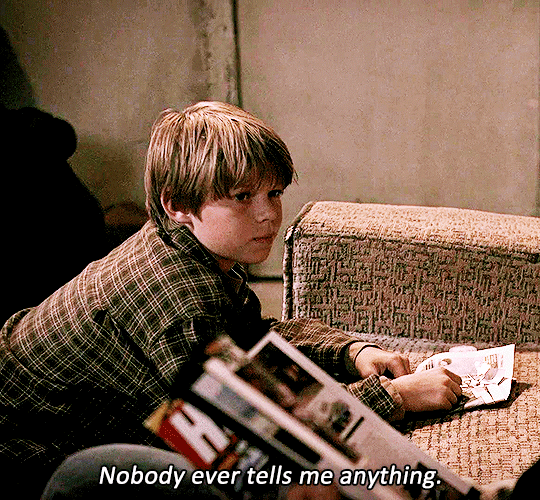

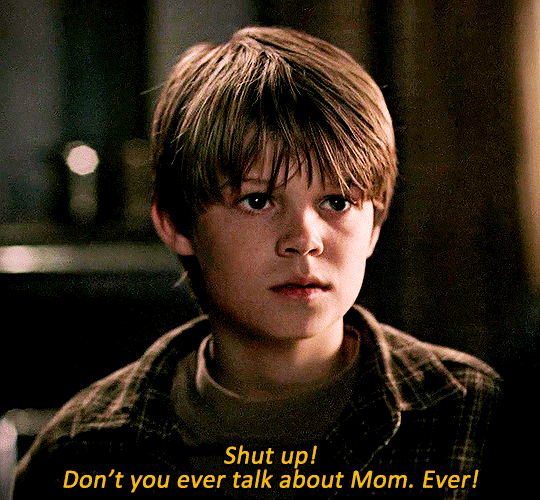



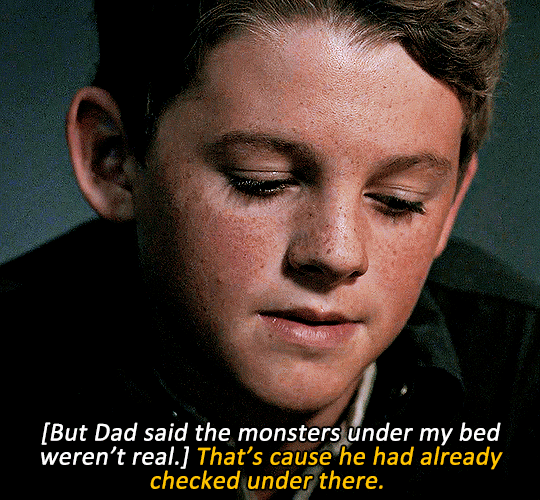


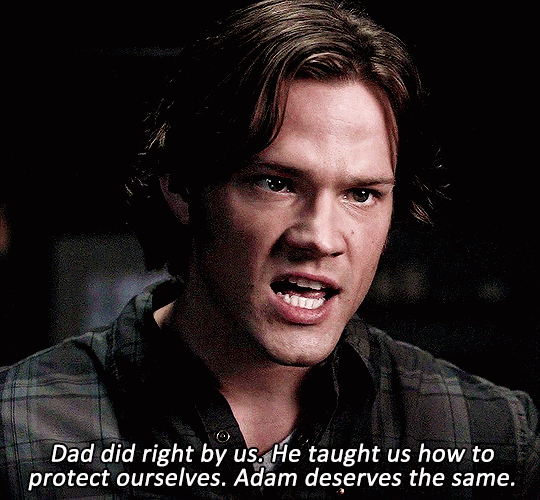
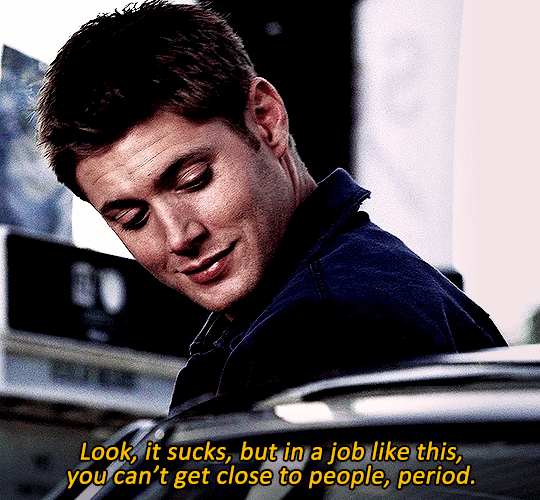
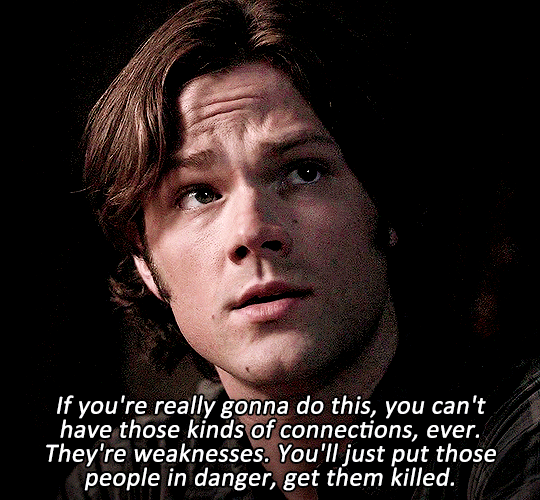

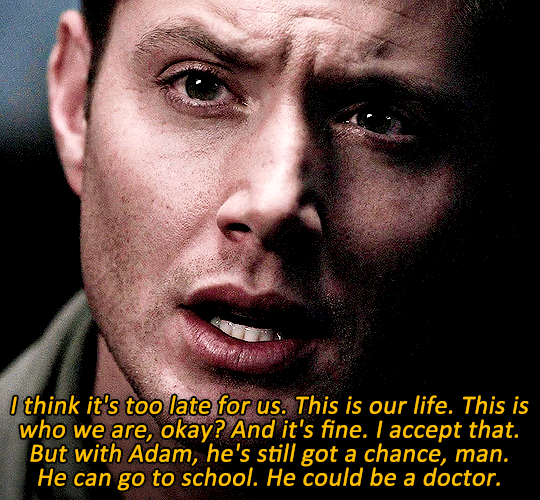

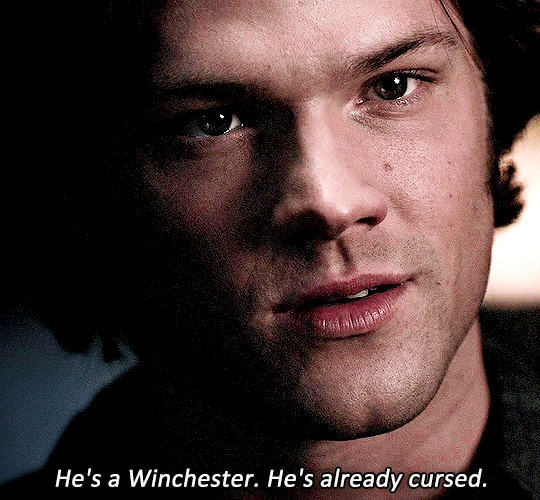
Supernatural
S1E01 Pilot // S1E06 Skin
S3E08 A Very Supernatural Christmas
S4E19 Jump the Shark
Do you see the parallels here? This is why I think people who say season 4 Sam was annoying also hate every other character in this show, they just don't realize that. It was not a big deal when other characters treated Sam the way they did, but when Sam started to mirror them you suddenly find it annoying? That's absurd. I know almost every filmmaking choice of this show is unfair to Sam and I hate that too, but still we audiences can see things from various angles and think for ourselves. And sometimes you need to see the story as a story, not something to take sides.
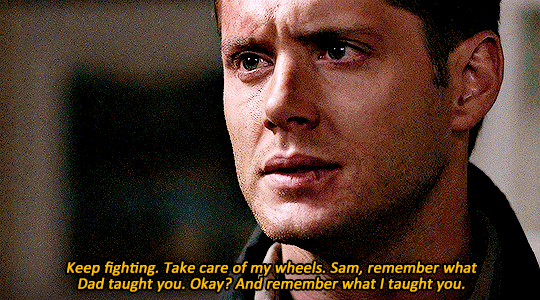
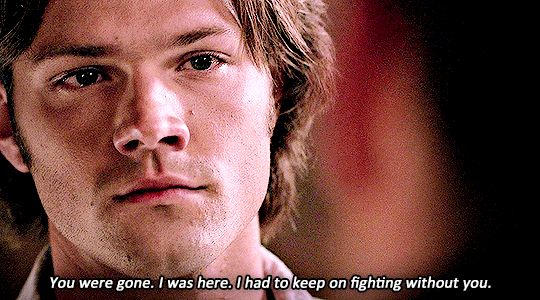
Supernatural S3E16 No Rest for the Wicked
Supernatural S4E04 Metamorphosis
Sam lost his entire family at the end of season 3. He was full of remorse, and to make up for that he was literally following his family's footsteps. Sam became obsessed with revenge like John did after Mary died. Season 4 was about that vicious cycle, the tragedy of it. Dean sold his soul for Sam just like John did for him. Sam tried to be more like his dad and big brother and did what they taught him. And Sam's relapse was a part of the addiction cycle. But Dean locking up Sam in the panic room changed nothing, the final seal was broken after all. So Lucifer gets out, and the oldest family drama is about to start all over again. It wasn't about who was right or wrong. It was about the circle, a never ending story. The next season was about restoring trust in each other and seeking redemption, and Sam eventually broke the chain by sacrificing himself. That's what makes Swan Song the tragic ending of all time. (though it all comes back as the show keeps going on... but what is spn without The Codependency™)
So, yeah, it's beyond me how some people can't see the reason behind Sam's choices in this season cause the context was SO clear. If you watch the show, you can see how much Sam and Dean affect each other and how much both are affected by John in different ways. And it's natural because they are family. We are who we are because of everyone and everything that has happened in our lives, and same goes for every fictional character, including Sam. It's just as simple as that. Sam was just trying to live by his brother's will while battling with grief and loss. He had to keep on fighting without Dean. And the reason why Dean wasn't with him was because Dean sold his soul to save Sam and went to hell for it. It not only made Sam the sole survivor of the family but also made the very being of him their entire legacy. Starting with Mary making a deal with Azazel, every choice ever made in this family is what brought him there. As I said earlier, it's the cycle. And a consequence. In short, if it is a sin, I think it’s everyone’s.
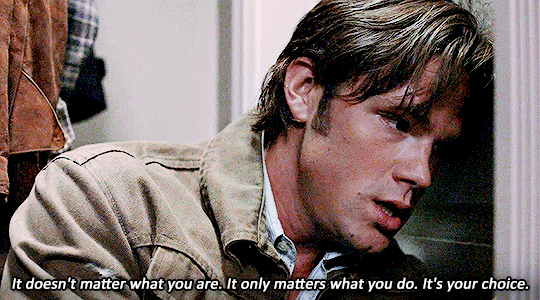
Supernatural S4E04 Metamorphosis
Sam and Dean's fate to be vessels? Their destiny? It doesn't matter in the end. This show was always about fate AND free will. Free will was always there. You always have choices. Sam was the one who believed that most desperately so he became the one who broke the cycle. Even though it was only the last page, he ripped out the written fate anyway and wrote the ending himself. YES HE IS THE MAIN CHARACTER. And after everything he did for the world, the story made him suffer eternal agony with the Devil because he is also a tragic hero figure. (SIGH literally the character of all time)
You can see this all only as an observer, as an audience. For Sam, the only thing he could do at the moment was just find the person to blame―in this case, it's a demon named Lilith― and get revenge. And he was lost somewhere along the road, he became an addict because he couldn't do anything about his loved ones dying, but when he drinks the demon blood it gives him power and a sense of control. (aaaaaand I still don't get why writers wrote this as some kind of diabolical desire in 4x18. I get it sammy what the fuck would chuck know about helplessness)
You can say you wouldn't suck up the demon blood, that's fine, but this story was written in this way, and if Sam didn't do that, the story couldn't go forward. Why? Because he is the main character. (It always had to be you, Sammy!) And reminds you that if you want to watch a show with multiple seasons, you have to remember what happened before to understand what’s going on now. So please don't make up things in your head, just go back to where it all started. There are contexts in everything. Everyone is a consequence of each other, but we don't have to be bound to that fact. We have choices: to change, to make things better. That's why we should be kind to each other, and for that, I love and respect Sam so much cause he didn't let his traumas define him and always tried to be a better person. ♡
I'm not done yet!!! see also this:
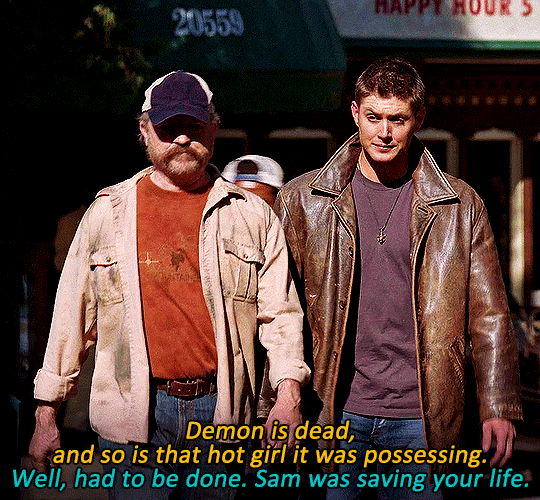
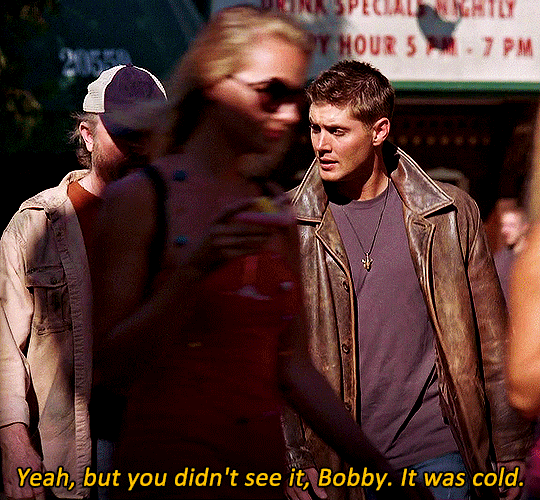

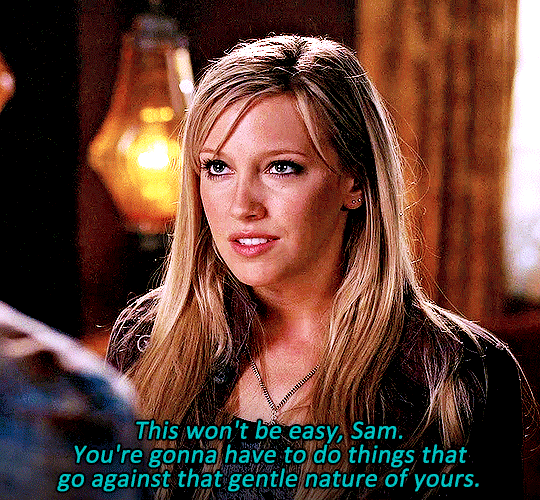
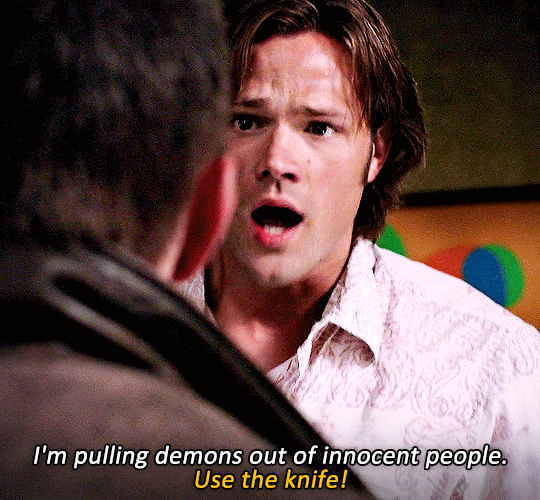
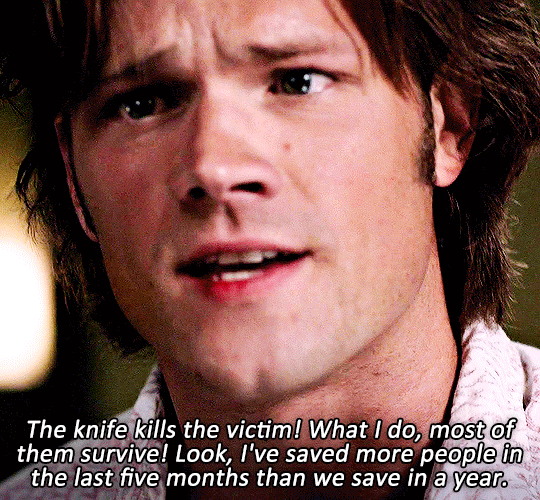
Supernatural S3E04 Sin City
Supernatural S4E04 Metamorphosis
Dean worried when Sam killed a demon with the Colt to save him cause it also killed a person who was being possessed, and it was 'cold'. But then when he finds out about the demon blood, he is so mad that he doesn't even care about the fact Sam was saving possession victims and just screaming in Sam's face "Use the knife!". It's so??? What is the logic here? This just proves it's always been about his feelings, not really about saving people. Is that an evil thing? No, I don’t think so. Dean is just a human, he can’t control what he feels. But if you use this to beat up Sam, I'll go feral then. Cause Sam is a human too.
And look at Ruby's masterful manipulation skill. Makes Sam feel guilty about everything, and comes back with what he needs when no one's left around him. She really was the best of those sons of bitches.
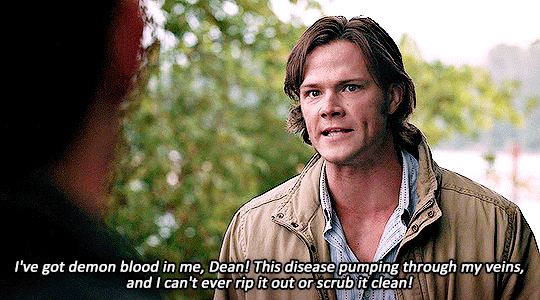
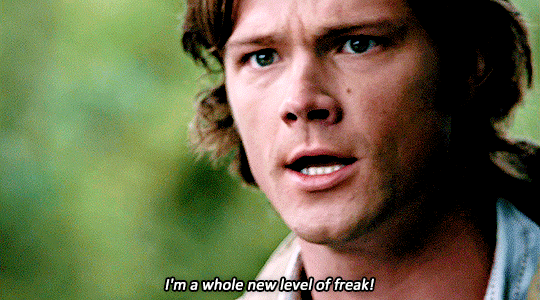
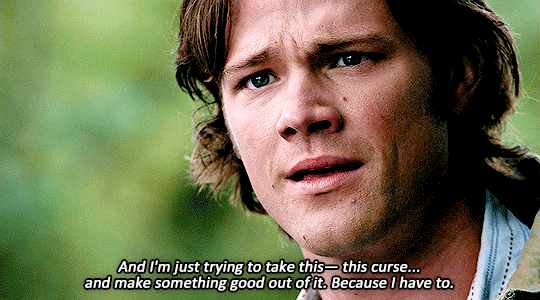
Supernatural S4E04 Metamorphosis
Seriously, what was Sam supposed to do? Everyone on this show didn't even bother to understand Sam and just decided everything he ever did was fundamentally wrong. Sam was using his own body to change the things outside of him, cause there is nothing he can do about the fact of his body, the blood in it. In life, there are things we can change and we can't. We have to live with that non-negotiable fact for our whole life. Sam learned this most painful way... And one thing about Sam is that he never let the unchangeable things make him give up the things he can change. It's not always a good thing though, cause Sam in s4 was very self-destructive. He was obsessive, and that is one of his problems. Sam is so stubborn and doesn't give up on anything easily. Actually this problem could be solved after s7 cause he tried to move on, but s8 happened… so it got worse, kept getting worse, and look what happened in s10. The most heartbreaking domino effect, I'd say...


Supernatural S5E03 Free to Be You and Me
Supernatural S5E06 I Believe the Children Are Our Future
Anyways, back to the point. Unfortunately, Sam started the apocalypse. And what did he do after that? When the whole world tried to hunt him down, the devil wanted to crawl inside him, and an angel called him an abomination? He didn't give up there to remain that abomination. He didn’t surrender. Instead, Sam begged for a second chance. He wanted to atone, wanted redemption. He still believed in others even though he lost trust in himself. He believed there was still something he could do about it. Even when he was possessed by Lucifer, he fought till the end to save his brother and the world. And he did it. He was a fucking hero at that moment, sadly a tragic one too. But the important thing is: Sam Winchester represents hope. (I think Swan Song was a perfect ending as a tragedy. This show got weaker and weaker after s5 which kinda ruined the perfection, but I'm also so glad the show continued cause this message fits more hopefully in Carry On. I needed to see Sam rewarded with something better than eternal agony after all those additional tortures of 10 more seasons.)
One last thing, you know what's funny about Metamorphosis? Dean had nothing to say about the fact Sam saved more people than when they were hunting together, so he just went "That what Ruby wants you to think?" Dude what was going on in your mind. like that was what Ruby intended, he was right about that only by chance, but I still find it funny that Dean said that at this exact moment. And he does this a lot, attacking the messenger when he can't refute the message. He didn't have any rational reasons like Sam, he just didn't like it and that's all(and honestly I think this can be an actual reason too cause there's a history behind it which I talked about it here. I wish Dean had just talked to Sam and had a real conversation. but he never talks about his feelings, that's what Dean Winchester does. so… yep not gonna happen. also, if the brothers have a healthy relationship, that is not supernatural lol), so he brought up Angels and evoked Sam's religious guilt. And the Angels in question also turned out to be manipulative assholes later. Everyone makes mistakes, but somehow Sam is always the one who gets most condemned and blamed. Dean, On the other hand, is justified by the narrative so many times even when it is actually his fault. As I said, unfair. This is not even a Dean crit post, I'm just mad at unreasonable people and the way this show works in general.
I swear I was normal before watching this season. Sam's demon blood arc was what made me insanely fall in love with him, so when I found out all those hate for Sam… that really could be my villain origin story but instead I chose to be on tumblr, so yeah I believe love wins<3 ha what a way to end a post. sorry guys
#sam winchester#dean winchester#spn 1x01#spn 1x06#spn 3x08#spn 4x19#spn 3x16#spn 4x04#spn 3x04#spn 5x03#spn 5x06#s1#s3#s4#s5#gifs#i don’t agree with this show on so many things and some of the later seasons just piss me off except for occasional good episodes#but the first five seasons of spn are always worth talking about#spn meta
185 notes
·
View notes
Text
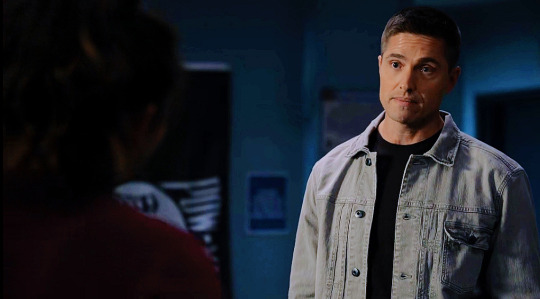
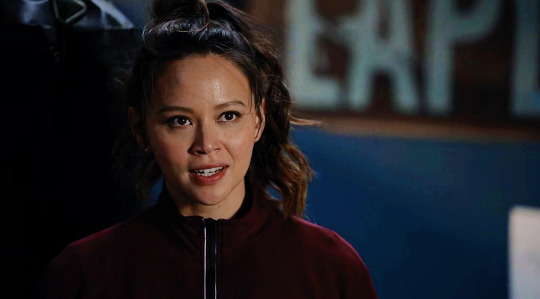
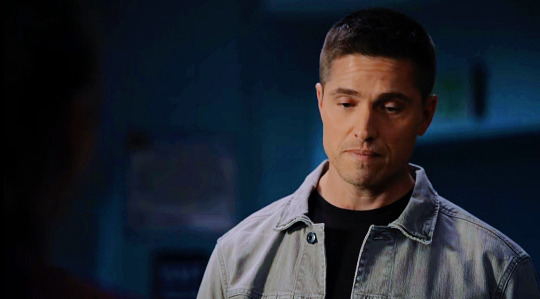
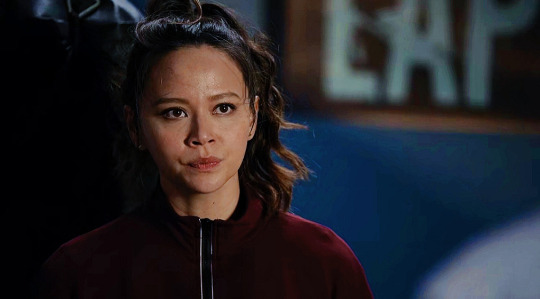
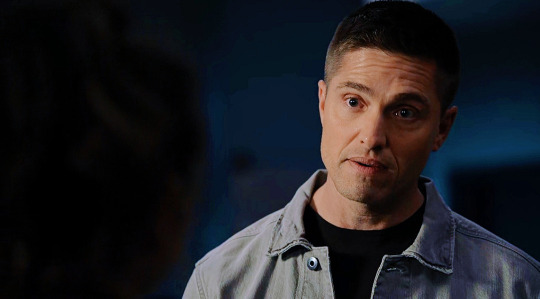

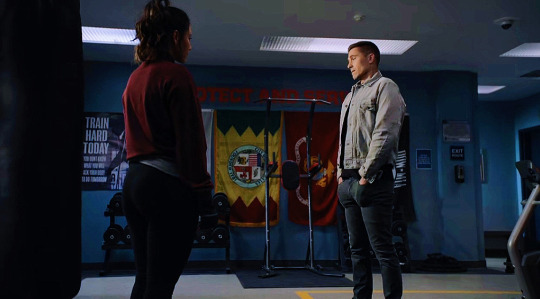

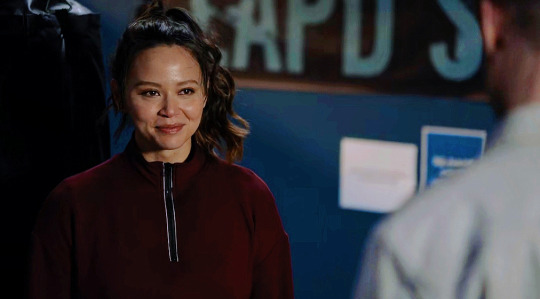
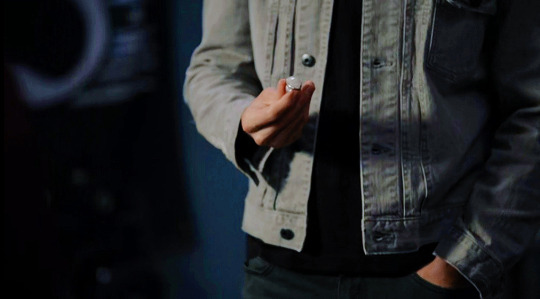


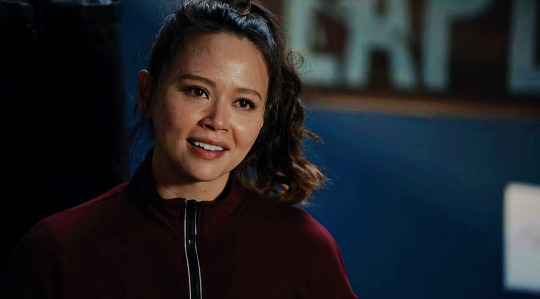
You can choose to see that tattoo as your greatest failure. But I see it as proof that you're a survivor. It wasn't your day of death, Officer Chen. It was the first day, of the rest of your life. And no one can take that away from you.
| ANATOMY OF A SCENE - CHENFORD EDITION
2.12 - Now and Then
This has to be my favourite moment, along with Lucy making an audiobook for Tim… Maybe it is because these two scenes have a very similar vibe… both of them taking place in the gym… with both Tim and Lucy working through their frustration in the same fashion… and making the other feel more empowered…
Back then, she was fiercely telling him that his 'learning disability' was nothing to be ashamed of, and instead, was a strength… And here he is, saying something akin, just as passionately : that her tattoo isn't a sign of weakness or failure on her part, but one of strength. Of resilience. It's more than just reassurance : it's really about empowering the other… And this is genuinely a beautiful and powerful message, that epitomises their relationship perfectly...
The way the camera focuses on Lucy's DOD tattoo, with Tim appearing in the background, before he fully comes into focus, is brilliant. Him looking away, pretending he hasn't seen it, out of respect for her and complimenting her instead, is such a simple, but meaningful thing. Just like how he refuses to take any credit for the way she is. The reverence and pride in his voice are all for her. He's trying to drive his point home, but Lucy is not hearing him. Or at least, not entirely.
He's about to leave before changing his mind. You can see the moment he decides to go for it and really talk to her. Something he has been trying to do already, like after he heard she was involved in a shooting : only, he kept it light in that moment, not daring pushing her out of her comfort zone. But his conversation with Nolan made him reconsider his approach, once he realised that her friends were too focused on her tattoo, treating its removal as a magical cure to her emotional wounds. No matter how well intended they are, it doesn't work like that. Something he knows all too well.
So instead, Tim opens up about his own traumatic experiences, share his own history and scars to help her… And this is huge for him. Lucy might have known about Isabel, but this is the first time he mentions his childhood and his dad to her (at least, as far as we know : he did it once while playing football with AJ, but she wasn't around). It's a very personal and intimate topic and the fact that he willingly shares this vulnerable part of himself with her says a lot on how much he trusts her. And it also feels natural : they were already getting closer, but regardless, this is the same man who opened up about his personal life on her second day. He has seen how she was there for him time and time again, with Isabel of course, but even recently, with how she made him feel safe after discovering he was a kinesthetic learner. So now, this is his turn to do the same for her, to respond in kind. And it parallels what Nyla was trying to do with Lucy when she shared her very own experience in the shop… and with Tim when she shared pieces of it in order to convince him to let her ride with Lucy for the day. He took a page from Harper's playbook, understanding that it might help Lucy more.
But unlike Nyla, Tim goes a step further. The reason why Lucy wasn't quite as receptive with her is that she needed more than empathy. It helped her of course, but what she requires even more is seeing her trauma in a different perspective. To see it through someone else's eyes. Tim's eyes. They already have a special bond and his opinion matter a lot to her. She can get through to him like no one else and so can he. But this is even more important since they haven't been able to ride together since that fateful day. She thought at first that the change in TOs for the day was a Tim Test. So it is primordial that she knows he doesn't think less of her. Just like he probably also doesn't want someone else he cares about to believe they're not living up to his standards…
And at first, Lucy was getting frustrated with him as well. Even angry that he wasn't getting it. Until he started to emphasise on the fact that she didn't die, that she's still very much alive and therefore won, just like she defiantly warned Caleb in her last words to him. He's trying to get her to focus on that victory. That what she sees as a sign of failure, is instead a sign of resilience. Of her own strength. And I absolutely love how going forward, she will rub her tattoo whenever she's getting nervous, as a reminder of this.
Because this is such an earnest and powerful message. At no point does he tell her what to do with this or how to feel about it - which was inadvertently what Jackson and Nolan were doing. It's simply about pushing her to see things under a different prism so she can make an informed decision. One that will bring her peace. To help her see herself the way he does : as a survivor, as someone who saved herself. Not a victim. It's about her retaking some control of her own story. And this time, she gets his message… The way she is clearly moved by his words, tearing up, just shows how much she needed to hear these words. Especially from him.
The tone of the scene instantly changes after that, becoming much lighter… Without undermining the core message either. This is a much needed respite, after that intense conversation.
Tim looks so self-conscious and bashful when Lucy thanks him, like he's suddenly feeling under the spotlight. His whole demeanor - hands in his pockets, rocking on his feet, asking her if she's riding with him - feels very much like a teenage boy asking the girl he has a crush on to go on a date with him, while trying to be nonchalant about it. His beaming smile when she agrees is adorable. Her laughter as well… It's clear he has missed riding with her. They both have.
And that leads us to that last part : Tim giving Lucy back her ring. The one she left behind for him to find… There are so many symbols here… Like the fact that he had it in his pocket the whole time, even though he was about to leave her alone at first… The implication that he kept it with him, that he hung on to it, as a reminder that she was safe now, that he found her… It's how he's playing with it as well, as if a part of him is a bit reluctant to part with it… It's the way they don't even need words : they both understand the underlying message… It's in his smile before he leaves, the admiration he feels for her shining bright in his eyes… Or her surprise and delight when she catches her ring, having the confirmation that she was right to have so much faith in him… And how overwhelmed she is, to know that this tiny piece of jewellery, thrown as a last-ditch effort, saved her… That she saved herself.
This moment encapsulates everything he has previously said in a very poetic manner… It was the perfect conclusion. Melissa deserves all the credit here for pitching this idea to the showrunners and writers, who, then, turned it into this wonderful scene. And hopefully, there will be a follow up one day on this...
108 notes
·
View notes
Text
okay so I’m having a lot of feelings about the parallels between Anakin and Bode’s fall to the dark side and I need a place to scream about it so here it is
putting the rest under a cut because I already KNOW I’m about to go off
alright and before I go any further, I want to clarify that I don’t imagine the writers for Survivor sat down and went “hmm what kind of character can we make to rival the tragedy of Anakin? I know! we’ll just make the same character… but different…” I just think that the general path to the Dark Side tends to be similar for a lot of people. there just happens to be a lot of overlap for these two characters specifically. and if the similarities WERE intentional. well. honestly that would be very Star Wars-core of the writers. the overlapping rings and parallels between trilogies has been important to the storytelling of Star Wars from the beginning.
moving right along tho. I think it’s impossible to say when their actual journey to the Dark Side TRULY begins (I imagine Anakin growing up a slave and Bode living through the Purge might have been the whisper of wind that eventually blew over the first domino) but I think it’s safe to say that the Big Moment for Anakin was when his mother died in his arms. and his heart was so filled with grief and anger that he was driven to revenge. not just the men… but the women and children too. we all know the story.
and it’s harder to know for sure with Bode, since we don’t actually see his reaction, but I’d wager losing his wife had a similar effect on him. even Kata herself says that losing her mother changed her father. and we know from the post-game Force echoes that, aside from protecting Kata, Bode’s work for Denvik was also to learn the identity of the Inquisitor who killed his wife. he’s been living with this burning seed of rage in his heart, this desire for vengeance even though revenge is not the Jedi way.
so then you just have these two people, living with the GUILT of not making it in time to save the one they loved. these two people who have been so traumatized by their loss, that the thought of losing anyone else is unbearable. the love that these two hold for those still living that are closest to them— for Anakin it’s Padme, for Bode it’s Kata— is corrupted by fear and turns into attachment. slowly but surely, they are consumed by one impossible goal: protect Padme/Kata AT ALL COSTS.
enter The Cost. at a certain point, Anakin becomes convinced that Palpatine is the only one who can help him save Padme. he’s willing to throw away EVERYTHING ELSE for that one chance. he’s willing to kill younglings, he’s willing to execute the entire Jedi order for it. he’s willing to break Padme’s heart. meanwhile, Bode becomes convinced that Tanalorr is his one salvation for Kata and he’ll do whatever he has to in order to get her there. he’s willing to kill Cordova, he’s willing to lead the entire Hidden Path to their doom for it. he’s willing to trap Kata in a life of isolation— as long as she’s still ALIVE.
and all throughout this, these two have formed this brotherhood with a certain someone. a bond formed through the hell of fighting a seemingly endless war. for Anakin, it’s Obi Wan. for Bode, it’s Cal. it’s so interesting to me to think about the last interaction these two pairs had with each other before Everything Happened. Anakin seeing Obi Wan off before he takes on Grievous. Dooku was already dead. after all this fighting, the war was SO CLOSE to being over. Obi Wan tells Anakin he’s grown to be a greater Jedi than he could ever hope to be. and then contrasting Bode’s last night with Cal. after all this fighting, they’re so close to finally being SAFE. the guilt of what Bode’s about to do weighs so heavily on him, yet Cal can only see a brighter future. he tells Bode that they couldn’t have done it without him. these quiet moments of connection before they lose everything.
then everything just comes to a head when these brother figures finally confront Anakin/Bode. Anakin flies off to a fiery hellscape. Bode flies off to a lush paradise. they both believe they’ve left their brother behind for good. and then Padme unintentionally brings Obi Wan to Anakin. Kata very deliberately takes Cal to Bode. I think it’s at this moment where both Anakin and Bode go from agitated to full on enraged. there’s such a clear moment where the both of them snap and it’s no longer about “protecting” their loved one, it’s about destroying this one person who stands in their way. Anakin Force chokes Padme. Bode lashes out with the Force at Kata TWICE. (At one point, Kata may have even fallen to her death if Merrin hadn’t been there to save her.)
the tragic ending to both Anakin and Bode’s story happens when they lose themselves and fight to kill their brother. the tragic ending to their story happens when they become the very danger they fought so hard to protect their loved one from.
I think there are two main differences between Bode and Anakin’s story. the first is from an audience perspective. I mentioned before that we don’t actually SEE a lot of Bode’s story leading up to his fall. Anakin, however, we see from the very beginning. except we KNOW he’s doomed. we KNOW he’s going to end up as Darth Vader. we just don’t know HOW. and it’s heartbreaking in its own way to see Anakin be so fundamentally GOOD knowing how he’s going to end up. Bode on the other hand…
from the beginning, Bode is just a guy. he’s Cal’s new friend. he’s a great fighter and he immediately fits right in with Cal’s family of strays. you have no idea what’s coming. personally, when I first played, my only suspicion of him was that he was beginning to doubt Cal’s vision of Tanalorr. and I thought maybe he’s right? a running theme of the game is that Cal just doesn’t know how to STOP FIGHTING. perhaps Bode just thinks this supposed safe haven from the Empire isn’t the place to… continue the fight against the Empire. and even after Bode blatantly betrays everyone, the extent of his motivation wasn’t clear to me until the confrontation on Nova Garon. before then, I was doubting everything he’d ever said. did he actually have a daughter named Kata? was his name even really Bode? these kinds of questions never come up in Anakin’s story. we know everything about him and WHY he’s doing it. but I think this unknown factor around Bode is what makes his betrayal just… sting more. it makes US want to shout, “you were Cal’s brother, Bode! he loved you!”
and finally the second difference which is from a narrative perspective. and it’s the fact that, at the very end, Anakin DID return to the light. Bode never got that. and I think it mostly hinged on the fact that people still BELIEVED in the good in Anakin. it was one of Padme’s dying words. there’s still good in him. Luke was ready to DIE for that belief. Luke absolutely REFUSED to give into fear, to strike down the Emperor or his father in anger. at the most critical moment, Luke resisted the Dark Side. he chose love and THAT’s what saved Anakin and brought him back to the light.
for Bode… he didn’t have that. I’m not sure if anyone really believed in him by the end. which is… understandable. as I said earlier, I myself was questioning everything about Bode after his betrayal. I can’t imagine how Cal, who trusted Bode with HIS LIFE, would feel. Merrin herself told Cal it was kill or be killed. Cal even admitted that he has so much hatred for Bode. hell, he even straight up “embraces the darkness” to win his fight against Bode. Cal gave Bode multiple chances to surrender, but his motivation to give those chances were all about Kata. it was all about how Cal and Merrin know what it’s like to lose their whole family and don’t want Kata to go through that. not once does Cal say “I know this isn’t you, Bode. I know there’s still good inside you.”
this isn’t a criticism on Cal, by the way. he’s walked a very different path than Luke. he’s at a very different point in his journey than Luke was when he confronted Vader. Cal was (understandably) in the middle of battling the Dark Side in HIMSELF at the time. he wasn’t in a place where he could pull someone ELSE from that path. and honestly, I think it just makes this story that much more heartbreaking. maybe there WAS a chance for Bode, but the stars just, very tragically, weren’t aligned for him.
I don’t really have a conclusion for all these thoughts, just that it’s so fascinating that their stories are so similar despite such different circumstances. it’s so fascinating that they still somehow ended the same yet so differently. I’m really going to be thinking about Bode’s story for a long time. I haven’t felt this way about a character’s arc in… awhile. it’s such peak Star Wars to me, to be honest, and it’s really disappointing knowing that the audience for this story is limited to just gamers and people who enjoy watching gaming videos. it really deserves the attention of a mainstream movie, in my opinion.
#star wars#jedi survivor#bode akuna#anakin skywalker#cal kestis#star wars meta#oops sorry for standing on a soapbox for a hot second there at the end#it’s fine#kata akuna
60 notes
·
View notes
Text
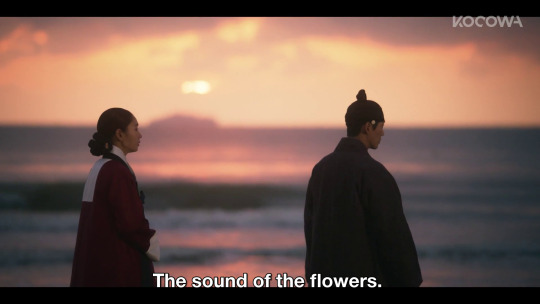
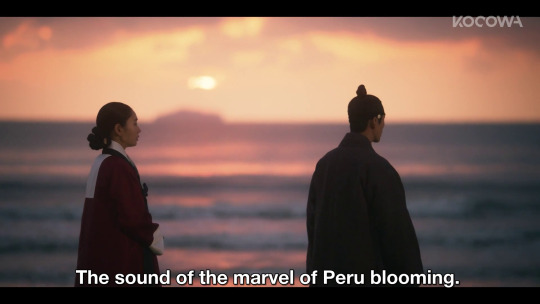
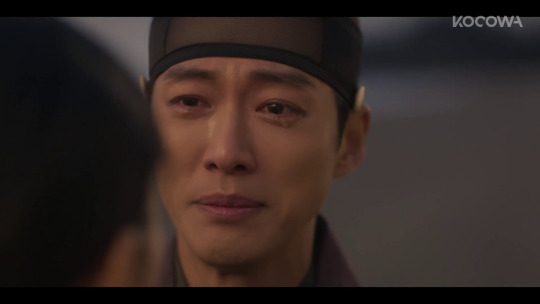


Happy Ending for these two, after the drama drank gallons of my blood.

I am so relieved, I don't even care about the fact that he's got amnesia TWICE (I wonder if initial bout was due to extension) or the fact that surely the survivors of the army sent to take him down would have given away to someone in authority that Yeon Jun basically let him get away (or that Gil Chae seems to have forgotten about her mad father and little brother utterly.)


This writer does have a (welcome to me) tendency to go for happy endings that may not be realistic but feel welcome in fictional contexts. Rebel was a marvel of a drama but its very happy ending felt incredibly unrealistic - the horrifying ending of Hong Sisters' Hong Gil Dong felt a lot more likely for that type of story. And the same is true here - a tragic ending would have been a lot more likely. But being spared this feels wonderful. (And now we know what those voiceovers are about - it's her telling him about their past, so at to help fill memory gaps.)
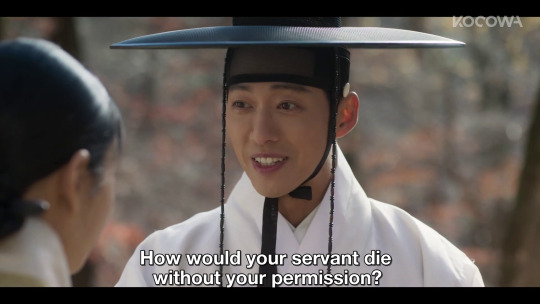
Ultimately, this drama had its flaws unlike e.g., Chuno, which for me was flawless, but most of it was amazing, amazing, amazing.
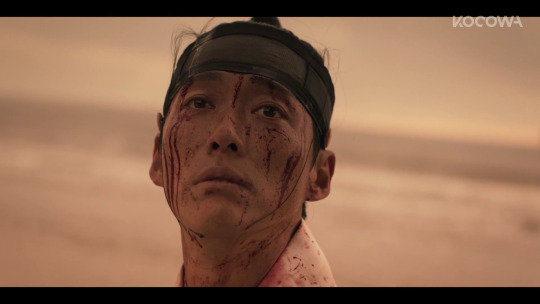
A couple of non-ship things I loved: the resolution of Yeon Jun's story. I know most people didn't like his character and I can't say I'd want him as a friend or a family member, but it was a fascinating arc for someone who was a lot more in line with a "proper" aristocrat of his time, and honestly his story would have made a fascinating 19th century psychological novel. He has finally learned to see grey and go against the norms and it almost drove him to kill himself and - it was a very interesting character and story to me. But oh boy, did Gil Chae dodge a bullet in switching her affections back way when!
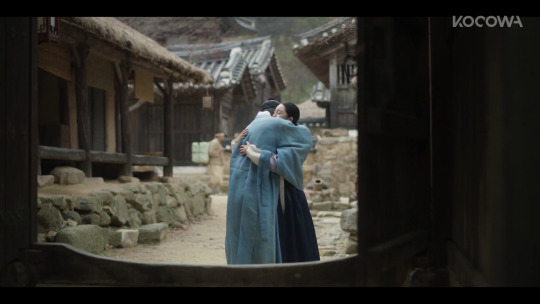
The story with Jang Hyun's father was exactly as expected and yet I was still taken aback by the petty horror of it all. The old man killed his whole family (or so he thought) for illusory fame and when given a chance to redo, chose to do the same thing again. Realistic. And none of it even made him happy - hence the suicide - but illusions of what he is to the rest must be maintained. JH's face as he said he now knows the most precious thing to the old man wasn't him.

You know what made me cackle in demented glee? Injo's end. Calling for the son he ruined, whose death he caused, whose loved ones he exterminated (his wife, his sons, the people the prince cared for.) Interesting parallel with the Crown Princess' death btw - when she calls for So Hyun, she sees him come for her and there is light and peace. Injo's calls are unanswered and there is no light just darkness. The tragedy is that he actually loved his son as much as a monster like him could. It just wasn't any salvation to anyone.
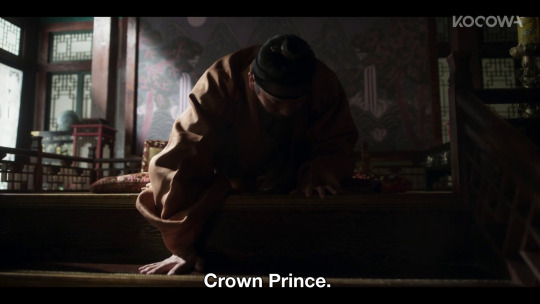

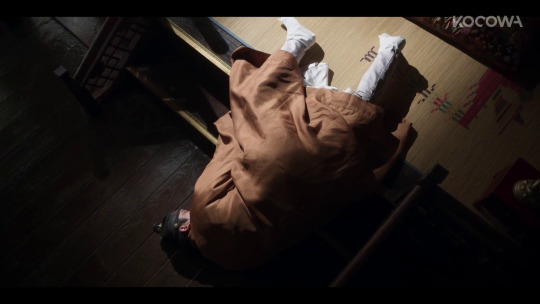
Just as Jang Hyun's father, he chose terror and "reputation" over his own child and their punishment is to die in despair, alone.
In conclusion, this was an amazing drama, with amazing performances, and only narrowly misses being my favorite kdrama of 2023 (and if either GK War or Moon in the Day implode, might still win.)
ETA: loved that they didn't end back in her hometown, because they didn't need to. They are each other's hometown, are they not?
56 notes
·
View notes
Text
Why people often confuses Connor's deviancy with Hank's relationship status:
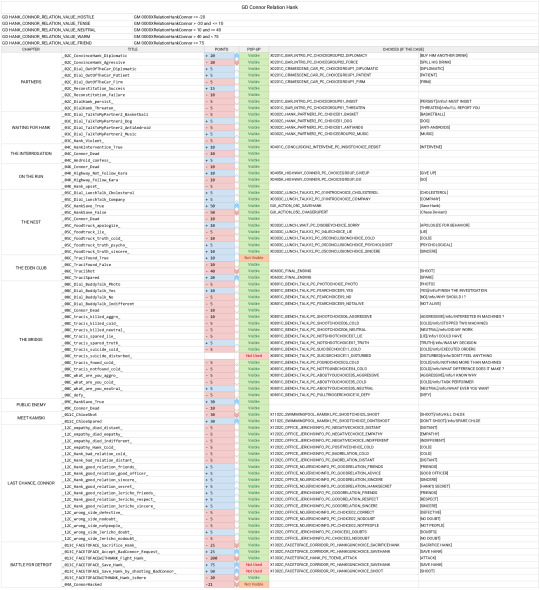
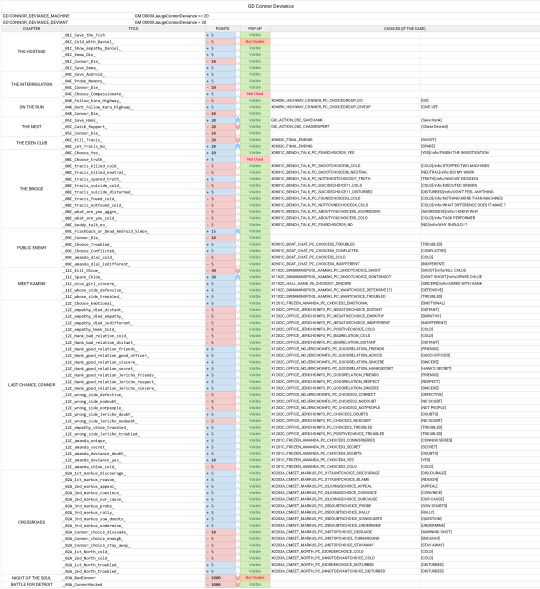
They got similar impacts after a point the story. Usually when the SI goes up are choices that also gonna impact Hank's rep positively. But as u can see they're totally unrelated, not only in the narrative but also the math system.
So, no... Connor doesn't deviate cuz of Hank. That's misinformation. I believe the devs themselves realized leaving a dialogue implying that would go against what they constructed and also becoming a plot hole when you're outside one specific route (an issue the game got overall).



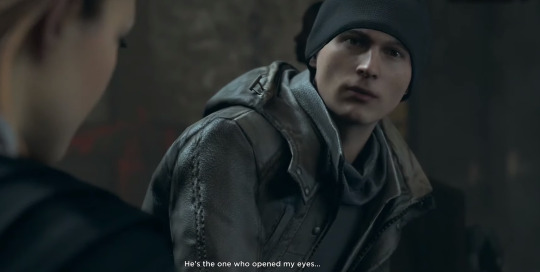

(deviant Connor about Markus if dude got killed in Crossroads)
According to the narrative there may be 3 main reasons why he can choose deviating:
Amanda AI betrayal, when he also thought he mattered enough for CL to not lie to him (Daniel parallel);
Finding common ground with the deviants story, empathizing with 'em (esp the Tracis);
Realizing he ain't doing "the right thing" by helping the megacorporation to repress androids - he included, as they're using him as just some tool.
As he may have 3 main reasons to choose not deviating:
Believe deviants are extremly dangerous to humans, a threat to the country and to innocent people - and he's the one that can help preventing chaos from happening (CL propaganda);
Believe deviants are no better than "bad" humans he met along the way and that he's the one that can help prevent chaos from happening (CL propaganda + experience);
Fear of failing his mission, his whole purpose and ending up as 100% nothing (not useful) for Amanda - someone he got a level of attachment -, consequently ceasing to exist (dying) in the end (not even destroyed but the existence totally deleted).
In resume Connor's machine vs deviancy clash looks like a mix of doubts/conflicts about the deviancy situation + fear of "death" (ceasing to exist).
According to the narrative Connor's main topic related to Hank, something not impacted about the machine vs deviancy clash, is his worry and empathy towards Hank's trauma: mf's a traffic accident survivor, got a bad relationship with androids "cheating death" due to his own son's death as it's basically an INSULT when all the guy wants is having his kid (kids are quite a relevant topic in Connor's arc btw) back in his arms + the belief an android is responsible for Cole's death in attempt to ease his own sense of guilty.
All dude wants is Hank to overcome this trauma cuz it worsened things like suicidal tendencies and alcoholism - and also his hatred for androids.





Ain't only cuz these personal issues can make his job difficult but also cuz he starts respecting Hank and where mf came from after a point in the game, even if he "hates" the guy's guts.


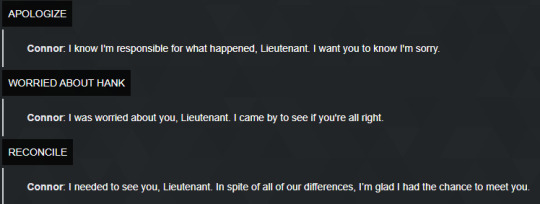
I'd say Hank's experience alongside Connor in the case witnessing deviants stories confirming his negative opinion on humans made him realize he was being a coward this whole time attacking the wrong people:






and sadly his rep with Connor alone is what decides if the guy finally act upon his bullshit and "uses his suicidal tendencies" to fight for what he think it's right (telling law enforcement to fuck off definitely) or die in cowardice in his own house by his own hand victim of this same issue.

I can't help but say it's again continuation issues as this scene makes no sense when you're outside a very specific route.

A better summary would be: Connor doesn't deviate cuz of Hank, but Hank "deviates" cuz of Connor (due to bad design cuz Connor himself shouldn't be the reason he changes his mind but the whole picture imo).

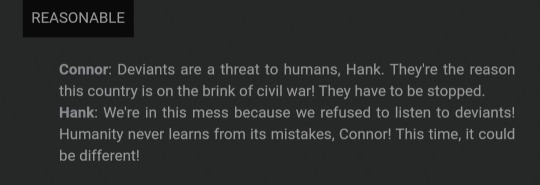
I believe to fully visualize a character and context in a game like this we need to analyze each variation in the story, not only playing a specific route - the easiest one they call "full best ending", the one the game itself helps u to get - cuz it's easy losing context and also a good part of the character's range of expressions. When u do that u realize the character got a base that won't change doesn't matter how u play.
I'm offering y'all material to work with and go explore yourselves cuz i've been seeing some terrible takes recently and got "where tf is this in the canon bible?". What u gon do with this info ain't my jurisdiction anymore, my mission ends here.
#dbh#detroit become human#dbh: how i think shit works#connor rk800#hank anderson#dbh observation list
40 notes
·
View notes
Text
No one asked, but here are my hopes for a third and final Jedi game…
Things I want:
• A reason for the characters not to be involved in the OT. My prediction is that Cal will be forced to destroy the compass to keep the colony on Tanalorr safe from the Empire, leaving them stranded with no way out of the Abyss, but having a small but thriving settlement with everything they need to survive. And then some day, after the Empire falls, some other Jedi (whether it be Luke, Ahsoka, Ezra, whoever!) will have to go on a mission to reach them and reconnect them with the galaxy.
• Kata training with the Force. Most likely she’ll be trained by Cal as a Jedi, but there’s a chance Merrin could also be teaching her some Nightsister magick. I’m looking forward to Kata being a fully fleshed out character.
• Declarations of love. I guess technically we got a little of that in Survivor, but both of them have yet to actually use the L-word! And I think we’d all scream at an “I love you” “I know” moment!
Things I don’t want:
• A Merrical baby. As much as it would make my shipper heart happy, there are two reasons I don’t want this. Firstly, introducing another kid would take the attention (and by that I mean the audience’s attention) away from Kata, who has yet to really have her time to shine. And secondly, it would probably contribute to the next thing in this list I don’t want…
• Threats on his family pushing Cal to the dark side. At least in a super blatant way. I’m fine with Cal struggling with the dark side, and given the way Survivor ended I’d say it’s almost necessary. (Although, I can’t see him falling completely, that would not be a very satisfying ending to his arc.) What I don’t want is Cal dabbling in the darkness in the name of protecting his family. First of all, let’s not prove the Jedi Order right! Second of all, we’ve had that story in Star Wars before! More than once! Of course, that was one of the big reasons for Anakin’s fall, but we even had that in Survivor with Bode! And while comparisons between Cal and Bode might seem poetic, they would be a lot more poetic if Bode was still alive. Obviously everything that happened still affects Cal, but from a storytelling perspective, you can’t really expect the audience to draw parallels between two characters if one never appears on screen. Case in point: Cal and Trilla shared a lot of interesting parallels in Fallen Order, but Trilla is only mentioned in Survivor once, and it’s in passing. But if Cal started doing unscrupulous things to protect his family, he would very quickly be reminded of Bode and stop himself from making the same mistakes. (Besides, lest we forget, Merrin doesn’t need protecting!)
• Cal dying. (And not just because I want him and Merrin to have the first true happily ever after in Star Wars.) It’s always the looming threat in anything set before the OT, especially with Jedi. I mean, never mind Yoda’s declaration to Luke in ROTJ that “the last of the Jedi will you be” because that’s already been proven false in pretty much every way; I’m fine with assuming that, believe it or not, Yoda may not have known everything! However, Cal has made himself a pretty high-profile Jedi in the eyes of the Empire, and one would logically assume that if he was around during the OT, Luke would have sought him out. Thus we once again run into the question of “doomed prequelitis.” Rogue One played this trope completely straight. Rebels mostly did not, but notably the two major Jedi characters were both removed from the equation. One in the form of death, and the other in the form of semi-voluntary intergalactic exile! (Of course there’s the loose thread that is Ahsoka, but there are lots of plausible ways to keep her out of the OT, so we’ll save that discussion for another day.) My point is the status quo that is established at the end of Survivor would not keep Cal and company off of Luke’s radar. They are still involved with the Hidden Path, which presumably would have ties with the larger Rebellion, and they would surely keep doing that as long as they are able. However, killing off Cal would be the easy way out in terms of storytelling. Even if his death was some kind of heroic sacrifice, it would once again be a story we have already seen many times in Star Wars. It would be lazy, repetitive writing, and with the time capsule that is Tanalorr, it does not need to be that way. All we need is a reason that they can’t leave Tanalorr and a reason no one can go in after them. Hence why I think the last compass will be destroyed!
Obviously these are just some overarching ideas for what I think the third game should look like and have little to do with gameplay or any kind of specific plot. I’ll leave that to Respawn! 😉
#jedi fallen order#jedi survivor#cal kestis#nightsister merrin#merrin#merrical#bd 1#greez dritus#kata akuna#tanalorr
67 notes
·
View notes